Wildwood: Beyond the ‘Plastic People’ and the Sound of Heavy 60s Psych
Oh, 60s California, what a special time to be young! It was the beginning of an era that, while brief, marked one of the most significant moments in music history.
Within this exciting cultural shift, new sounds were constantly emerging, and Wildwood was one of them. This truly heavy band from Stockton grew out of earlier garage escapades, morphing into an intense psych outfit fueled by ferocious organ playing.
Wildwood? They started as The Mal-T’s, a garage band with one single back in ’67. But that name, “Mal-T’s,” sounded like some surf group. So they changed to Zephyr Blue. Then their singer/songwriter, Bob Zachary, split to do his own thing. The rest of the guys just said, “Let’s continue.” They renamed themselves Wildwood and went full-on heavy. Their sound could be described as an extreme edge of psych with hazy basement undertones. You can hear hints of the era’s big names like the Doors, Steppenwolf, even a touch of the Band, but they were really after their original sound. Listening today they had their own rough-around-the-edges vibe, dark and mysterious, like they were carrying some secret blues from the wrong side of town.
What’s remarkable is how little of their music was released back then. Most of it was recorded at Max Weiss’ Fantasy Studios but remained shelved until Frantic Records unearthed it decades later. And what they found wasn’t just dusty leftovers, it was the real deal. I envy anyone who discovers such a unique slice of music history. Take ‘Plastic People,’ one of their rare 45s on Magnum Records. It possesses a punk before punk vibe, complete with fiery guitars and hard hitting lyrics. Then there’s “Steel Cathedrals,” which builds a moody, almost spooky atmosphere that truly sticks with you.
They played shows with major acts like the Grateful Dead and Steve Miller Band, yet Wildwood never broke through to the mainstream. Looking back, this makes sense, as it does for many other heavier bands from the late 60s. Perhaps that’s why their music feels so genuine, free of compromises and selling out. Listening to them now, you can still feel that mix of ambition and the messy reality of a band simply trying to make it.
Their story encompasses all the highs and lows you’d expect: friendships, fights, dreams, and letdowns. They were a band caught in a specific moment but somehow created something real. That’s one of the reasons I love to discover and write about bands from past decades; everyone brings something truly unique to the table: the stories, the fun, and most importantly, the music. Spanish friends Guerssen recently reissued their recordings, which they first did several years ago. So yes, Wildwood is a band that dared to be different. If you’re curious about the hidden corners of ’60s rock, Wildwood is definitely worth the trip.
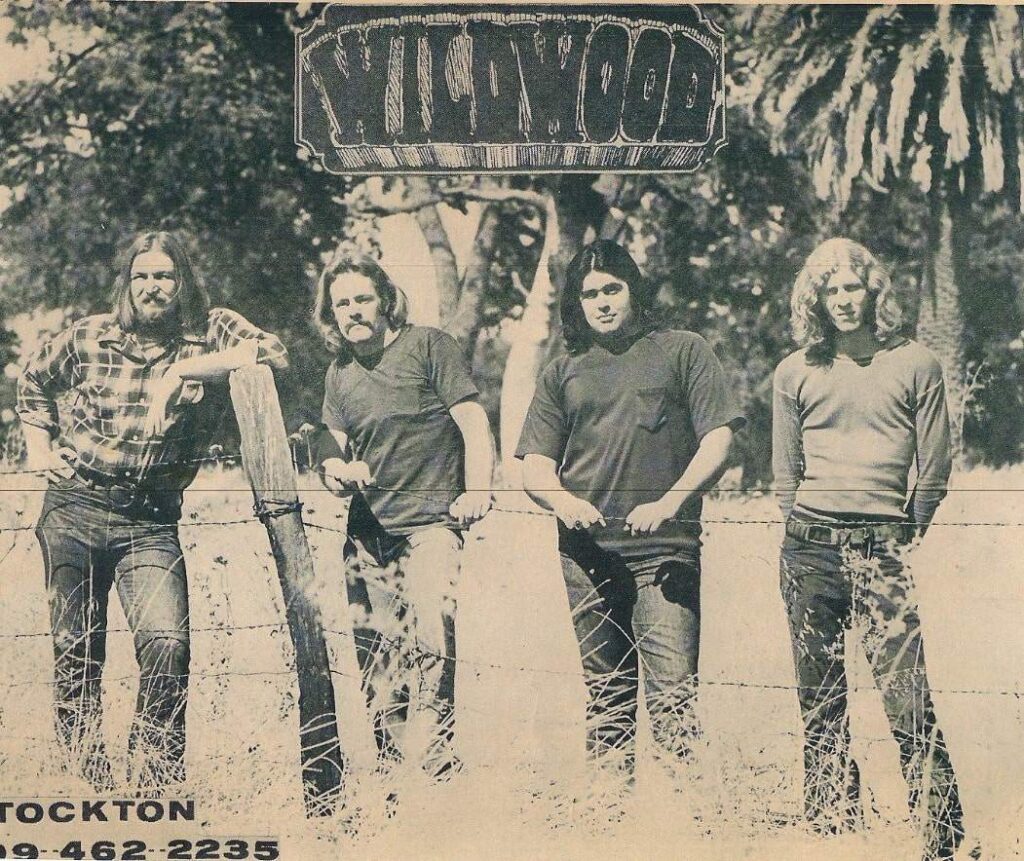
“This is Wildwood, it’s black, it’s dark, whatever it is, it’s us.”
So, what was it really like growing up? The small-town vibe, parents, friends… Did you feel out of place as a kid, or was there some kind of perfect storm that made you all tune into the same frequency later on?
Mark Stephen Ross: Stockton, CA was a pretty idyllic place to grow up. It had a small-town feel in those days, but it is only 90 miles from San Francisco, and it is also close to the Sierra Nevada mountains and Lake Tahoe areas. The San Joaquin Delta is a series of islands and rivers between Stockton, Sacramento, and the San Francisco Bay, so boating, fishing, and water sports are a part of life there. It felt really safe in Stockton when I was young, but it is not as safe these days. We lived in a great neighborhood with lots of kids playing in the streets. It was a very good childhood overall.
Frank Colli: I was a farm kid. Cattle, horses, dairy, and crops. Family ranch. Italian heritage. We left that life when I was 10 years old and moved to Stockton. My father bought a livestock yard.
Tell me about your parents. What were they doing when you were growing up? Was there music in the house, or were they more concerned with other things? Did they know what you were up to musically, or was this all a huge “WTF” moment for them when you went off the deep end?
Mark Stephen Ross: My dad was an attorney and owned a collection agency. My mom was busy raising my brother and me. When I was seven years old, my mom was taking piano lessons, and she thought it would be a good idea for me to do that. I took to it immediately and never stopped. My older brother had a record collection (Ray Charles, Roy Orbison, Dion, Everly Brothers, Elvis, etc.) and I was really drawn to local top 40 radio, so there was always music on in the house.
Later, when I was twelve years old and playing in my first band, my mom encouraged us to rehearse in our house, which was really great of her because we made a lot of noise. She really enjoyed it though.
My parents both encouraged my involvement in classical music and rock and roll. It was only a few years later, when they realized that I was determined to make music my main focus in life, that they got worried. “Please be a dentist!” was a recurring phrase from my mom. Very funny when I think of it now.
Frank Colli: My mother looked like Ava Gardner and sang like Lena Horne and Judy Garland. Hawaiian, Portuguese, and Scottish. My father looked like Clark Gable. Full-blooded Italian. Two-time Golden Glove boxer, biker, cowboy, rodeo bull and bronc rider. Wonderful parents. My 96-year-old mother is still in great shape and sings wonderfully. I am guessing Garland’s Somewhere Over the Rainbow was probably the first song she sang to me, and I heard it as a baby. Music was always in our lives. A piano in the living room was my mother’s.
You said you were influenced by everything from the local blues guys to the British Invasion. Was there a specific moment you knew you were going to be in a band? Was there a band you saw that changed everything for you?
Mark Stephen Ross: When I first started in bands, we played basic garage rock, surf, and R&B dance songs. The British Invasion stuff came a bit later, but the thing that really changed everything for me was seeing the Beatles on the Ed Sullivan Show. That is when I told myself, “I want to do THAT.” So much great music followed. The Stones, The Animals, The Zombies, The Yardbirds, Spencer Davis Group, John Mayall, Cream, and all of the great Motown stuff. Of course, the R&B greats like James Brown and Ray Charles were there all along.
Frank Colli: September 9, 1956. I am an eight-year-old kid sitting on the floor with my cousins and family at my uncle’s ranch in Lodi, California. I stopped eating my homemade peach ice cream and watched Elvis Presley on the Ed Sullivan Show. My mom still recalls how mesmerized I was. She asked me, “Frankie, what do you think about that?” My response: “I wanna do that, Mama.”
What about the local scene in the 60s? Were there actual “hippie” hangouts, or was it all a strange hybrid of uptight neighborhood types and underground musicians? Was there a sense of community among the freaks, or were you all just drifting alone?
Mark Stephen Ross: In Stockton, there was an underground hippie scene. One of my favorite hangouts was The Minotaur, which started out as a beatnik coffee house, then morphed into a hip music venue. I played there with the Mal-T’s, and many other local bands played there. On occasion, they would have bands from the Bay Area, most notably Country Joe and The Fish. The Minotaur did not last that long because the Stockton city government and police department hated the place, and they hated the hippie scene in general. They finally raided The Minotaur one night in 1967 and arrested all of the underage customers for curfew violations. I was among those who went to jail for a few hours. That was the end of The Minotaur. To add insult to injury, the building was demolished and replaced with a McDonald’s.
Frank Colli: Mostly school and dance hall dances for me. I was drawn to the soul and R&B sounds from the gate. We had The Minotaur. It was the hippie hang for the local college and hipsters. No bad memories for me as far as the local music scene interaction. A lot of great groove and ethnic diversity in the Stockton music scene. Good peeps.
My favorite Valley band was out of Merced. The Merced Blue Notes. Brothers, Hispanics, and Filipino boys. R&B. Always packed the house and kids were rockin’. Lot of fights and fast cars. Of course, hot chicks.
The Chessmen, The Coachmen, Frankie and the Fontels… What were these early bands like? Were you feeling like you were working your way through the motions, or was there some moment where you thought you had finally hit something real? Were these bands a stepping stone to Wildwood, or were you already locked into something uniquely yours by then?
Mark Stephen Ross: The Chessmen was a band made up of junior high school friends just finding out what it was like to play in a band. Really primitive garage stuff. The Coachmen were a band from the south side of Stockton, playing soul and R&B. James Brown, The Coasters, etc. That was a step up for me because they were more advanced as musicians. That was a great learning experience, absorbing that style of music.
The next band I was in after that was The Mal-T’s, which eventually morphed into Wildwood after some personnel changes. That was another step up for me. A fun band with good musicians. The style was surf in the beginning, then later more British Invasion and original songs.
Frank Colli: Not until Wildwood did my creative groove come about.
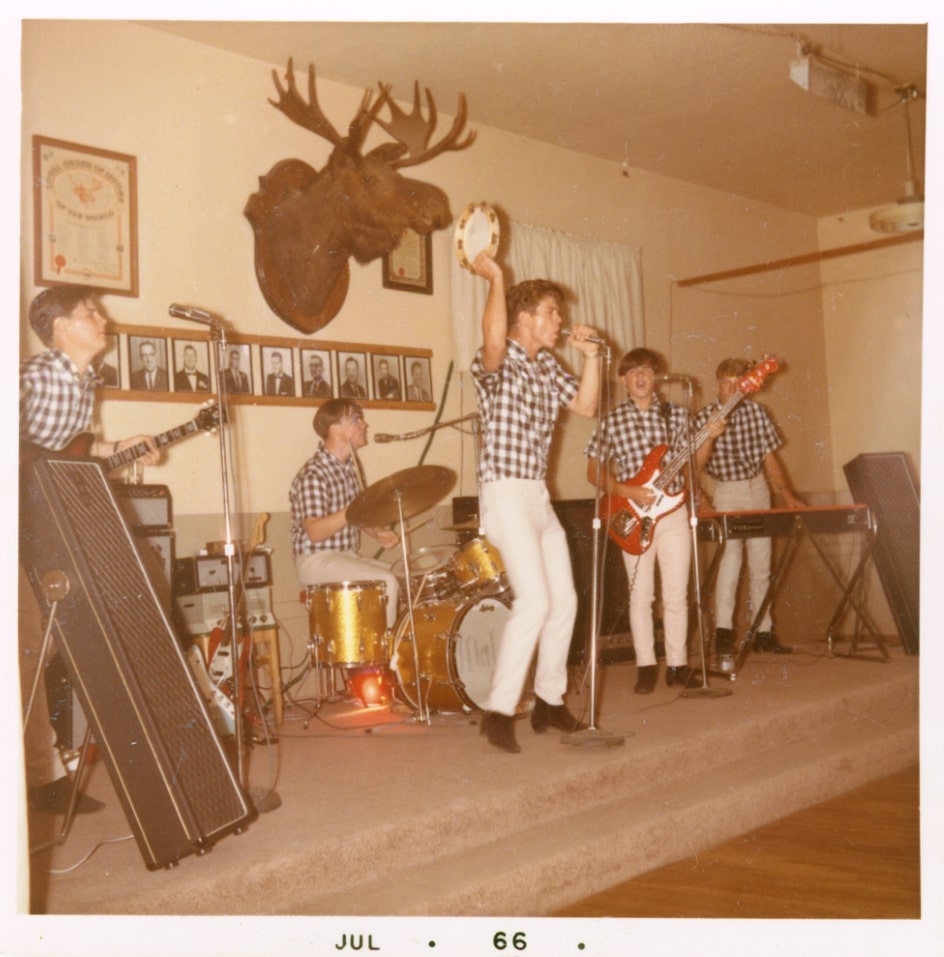
What clubs did you frequent in those days? Did you hit any legendary places in the area? I’m imagining dark, smoky rooms, the sound of a shitty PA struggling to play the latest Stones album… Were you building any connections that would follow you into the Wildwood days?
Mark Stephen Ross: The clubs I mentioned before were the hangouts in Stockton. With The Coachmen, we played mostly local high school dances. Later, with The Mal-T’s, we played high school dances in Stockton and other nearby towns. We played shows at various town halls and fairground venues in the Sierra foothills as well. Sonora, San Andreas, etc.
Frank Colli: No legendary places in Stockton.
What was on the repertoire when you were with pre-Wildwood bands? Was it all covers, or did you already start trying to introduce original material? Was there an element of “let’s just get by” or did you feel like you were pushing something new?
Mark Stephen Ross: In The Chessmen, we played basic garage rock, surf, and R&B dance songs like ‘Louie Louie’, ‘High Heeled Sneakers’, ‘Sleepwalk’, ‘Pipeline’, ‘You Can’t Sit Down’, ‘Green Onions’. I wrote a few very simple instrumental things that we played. I never felt like just getting by in any of the bands I was in, though. It was all very exciting to me, a whole new magical world of music unfolding.
The Coachmen was a mixture of Latino, Black, and White guys. The songs were more soul and R&B. Lots of James Brown stuff like ‘Night Train’, ‘Please, Please, Please’, ‘Try Me’, and songs by groups like The Drifters and The Coasters. We did not play any original music in that band.
When I first joined The Mal-T’s, the music was mostly surf mixed with The Rascals, Paul Revere and The Raiders, Love, Question Mark and the Mysterians, and early British Invasion stuff like The Beatles, The Yardbirds, The Animals, and The Stones. We played a combination of covers and original songs written by lead singer Bob Zachary. The experience of creating keyboard parts and helping with arrangements for the original songs was important for me, rather than just learning parts from records.
Frank Colli: For me, top 40 surf and rock. I was digging the soul and R&B bands, school dances and such. That caught my soul more than any rock I was hearing.
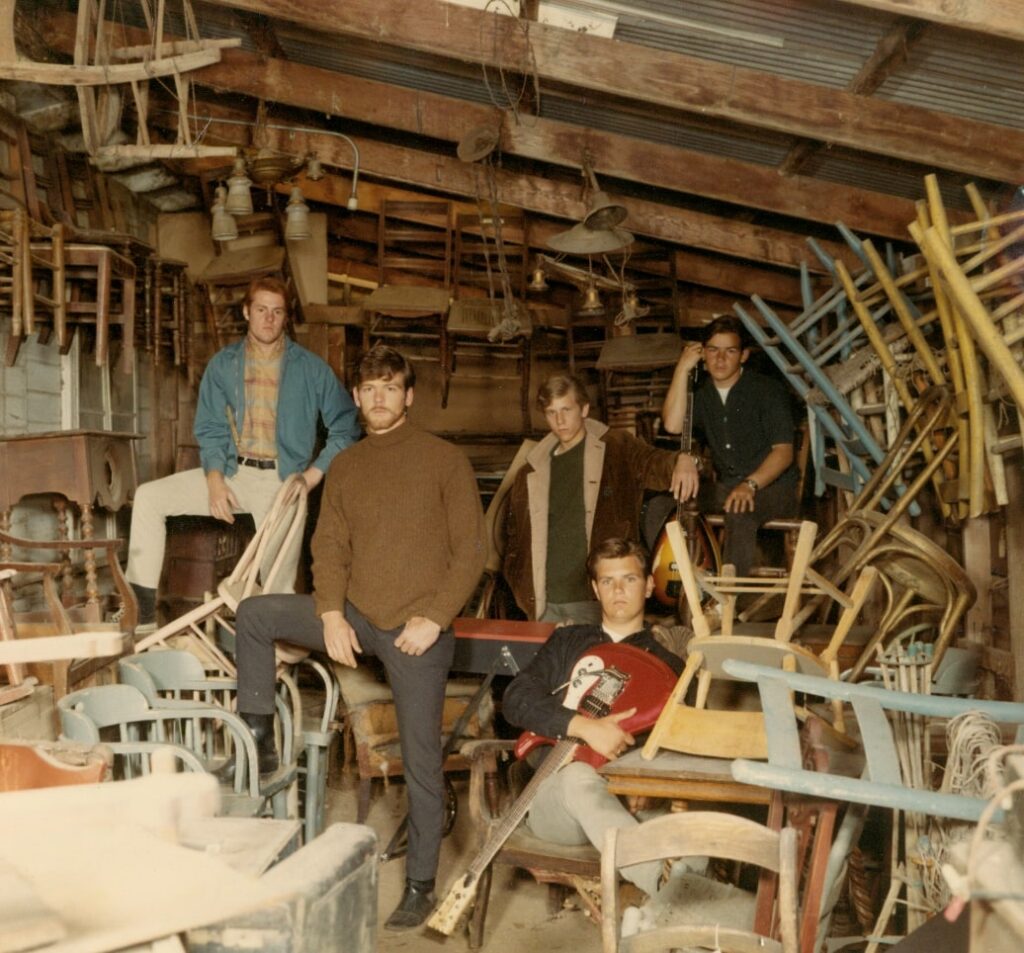
Did any of those bands release a single? Tell us more about it?
Mark Stephen Ross: The Mal-T’s released one 45 single, ‘Stand Up Today’, with the B side ‘Here To Stay’. We recorded the songs at Stereo Masters studio on Melrose Avenue in Hollywood. The session was engineered by Bruce Morgan, who was also credited as producer, but we really self-produced and laid everything down as we had rehearsed and arranged it. The trip to LA was exciting. I was only 16 at the time. When the session was over, we all went down to catch Buffalo Springfield at the Whisky a Go Go.
‘Stand Up Today’ got a lot of airplay on the local Stockton Top 40 radio stations. That was fun, being in high school and hearing the song on the radio. In recent years, the B side ‘Here To Stay’ has gotten more attention since appearing on the Pebbles Vol. 9 CD. I have seen the single for sale for several hundred dollars on eBay these days.
Frank Colli: None of mine.
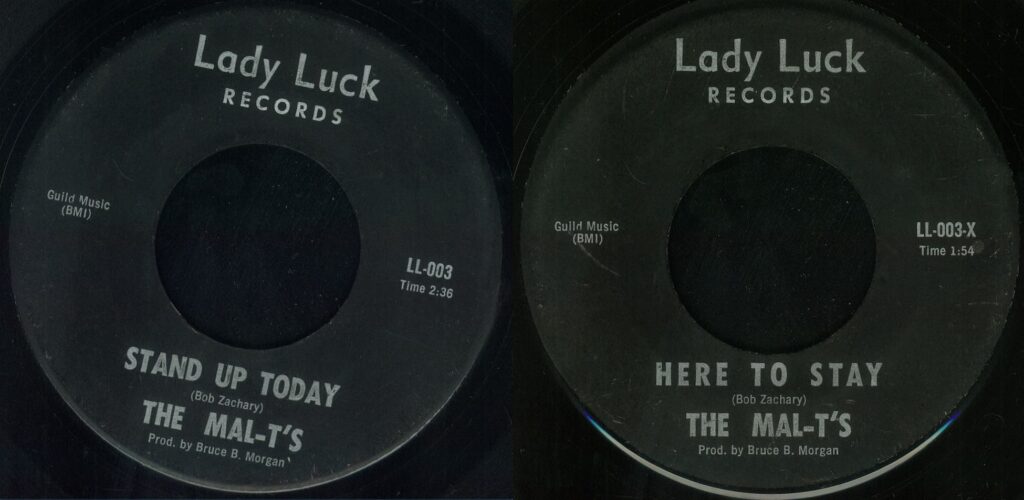
What about Zephyr Blue? Would love to hear more about this band.
Mark Stephen Ross: Zephyr Blue was the transition from The Mal-T’s to Wildwood. We wanted to change the name from The Mal-T’s because the name sounded like a surf band, and it felt outdated. The guitar player, Danny Williams, was drafted into the army, and the bass player, Johnny Hensley, quit the band. The replacements were John Turner on guitar and Frank Colli on bass. Frank was really a guitar player but agreed to play bass in the band. The drummer, Tim Mora, and I remained from The Mal-T’s lineup.
Zephyr Blue did some recording and a couple of gigs. Then Bob Zachary announced that he was breaking up the band. That was the beginning of Wildwood.
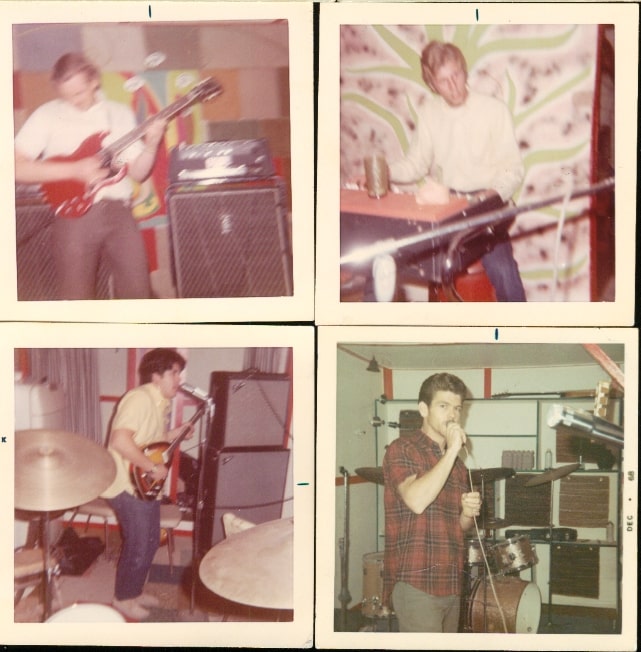
“As a pagan fertility ritual, virgins would dance around a maypole, which represented a phallus, in a forest called the Wildwood”
Okay, Wildwood. What’s the story behind how the members came together? Was it a cosmic meeting of the minds, or was it more like a bunch of desperate musicians scrambling for something that worked? Who came up with the name “Wildwood,” and what did it mean to you back then?
Mark Stephen Ross: With Zephyr Blue, Bob Zachary was the songwriter and he really was not open to other members contributing as songwriters. When Bob announced the dissolution of the band, I guess he thought that we would just scatter, but it did not occur to the rest of us to stop playing together, so Wildwood was born. We started rehearsing and writing together immediately. Bob came to us several months later and wanted back in, but we had become something else entirely by then.
I came up with the name Wildwood from a book I was reading about Medieval England. As a pagan fertility ritual, virgins would dance around a maypole, which represented a phallus, in a forest called the Wildwood. I thought it would be a great name for the band.
Frank Colli: I was recruited by Bob Zachary, the Mal-T’s singer and band leader. Two of his bandmates were going into the service (Nam vets), so he needed a bass player and another singer. I went to school in Lodi, fifteen miles north of Stockton. Most of my music buddies were north side Stockton and Lodi. I had never played or jammed with the same cats as Mark and the east side Mal-T’s boys.
Let’s talk about the band’s vision. When you started Wildwood, did you have a specific sound or concept in mind? Was it more about the freedom to experiment, or was there a deliberate attempt to capture something specific, a vibe that was unique to you guys?
Mark Stephen Ross: When Frank and John Turner joined Zephyr Blue, they brought a harder and grittier sound to that band, so when Wildwood started rehearsing, we went more in that direction. John was a great rock riff guy, and Frank took over as lead vocalist. One interesting thing is that Frank came from a soul and R&B background. As a singer, he was more influenced by Ray Charles than by any rock or folk-type singers, so Wildwood was a rock band fronted by an R&B singer singing rock. Tim Mora was a solid and aggressive but very inventive drummer. My influences were very eclectic, from my education in classical music to rock to R&B. I continued that classical education through my time with Wildwood at the Conservatory of Music at the University of the Pacific in Stockton.
I do not think we had anything specific in mind, mostly just letting the music take us wherever it led. After The Mal-T’s and Zephyr Blue, which were constrained by Bob Zachary’s vision, we now felt more freedom to experiment with what each of us had to offer creatively. As we progressed, the vibe was more intense and aggressive rock, especially the live shows. We really had a take-no-prisoners attitude on stage.
Frank Colli: As I remember, we just continued after BZ bailed on his own. Wanted back in and nope.
Were you buying your instruments locally? Was there one spot where everyone went to get their gear, or was it a free-for-all scavenger hunt? Who was the gear-head in the band, and how much did it matter to the sound you were crafting?
Mark Stephen Ross: I bought most of my Vox keyboard and amp gear from Jerry Lee’s music store on Pacific Avenue in Stockton. It was the largest music store in town at the time and was the local Vox dealer. Later on, I bought my B3 and Leslie from a local guy who sold and serviced them. I am not sure about the other guys, but there was a store called Bill’s Music that catered more to guitar players. John played only a Gibson SG and two Twin Reverbs. That was his sound. I do not think that anyone in the band was a real gear-head. We just knew what we liked to hear.
Frank Colli: Bill’s Music for years was our local hook-up. Jerry Lee’s was where the Beatles gear came from. A Mal-T’s hangout. At first, we had some Super Beetle amps that were cool and bad ass. Then we just got whatever we needed somehow.
Did you have any management early on, or was it all DIY? Was there someone helping you navigate the scene, or were you just booking clubs and hoping for the best?
Mark Stephen Ross: Technically, Max Weiss, who owned Magnum and Onyx Records, was our manager, but that was in name only. He did not help in any way with promoting the band or booking shows. His role was strictly as our record company and recording studio owner.
John Turner really was the guy that booked the band. He quit his day job to concentrate on promoting and booking the band.
Frank Colli: All of us were just scrambling for gigs in whatever venue. A local AM jock, Gene Laine, played our 45 single and got us a few gigs and a Sacramento hook-up. I believe he came up with the Wooden Nickel promo, haha. Got us some recognition with his little promo ideas, and as I remember, just a young dude doing his thing. Was cool to have a manager and all that, haha. I was 19 years old.
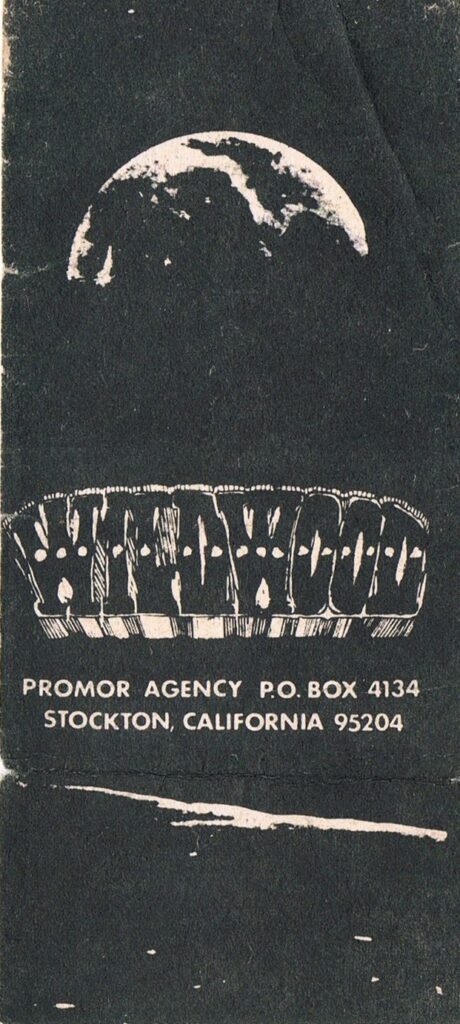
What venues did you play early on? Did you get any traction in the local scene before you were recording? Were you known for your live shows? What other bands did you share stages with, and did you get any kind of reaction that made you think Wildwood was something different?
Mark Stephen Ross: Aside from playing at Fillmore West and most of the clubs around the Bay Area at the time, we promoted our own shows, booking concert venues around the Central Valley and Sierra Foothills. Town halls, colleges, fairground venues, and similar spaces. We booked headliner acts from the Bay Area (Tower of Power, Cold Blood, Country Weather), hired security, sold tickets through local music stores, created posters and posted them around the towns prior to the show, and then we would be the opening act for the headliner. We booked some shows around Stockton in partnership with the local underground newspaper The Stockton Silver Hammer, and also got booked as an opening act for bigger concerts, opening for the Steve Miller Band, Ike and Tina Turner, and the Grateful Dead.
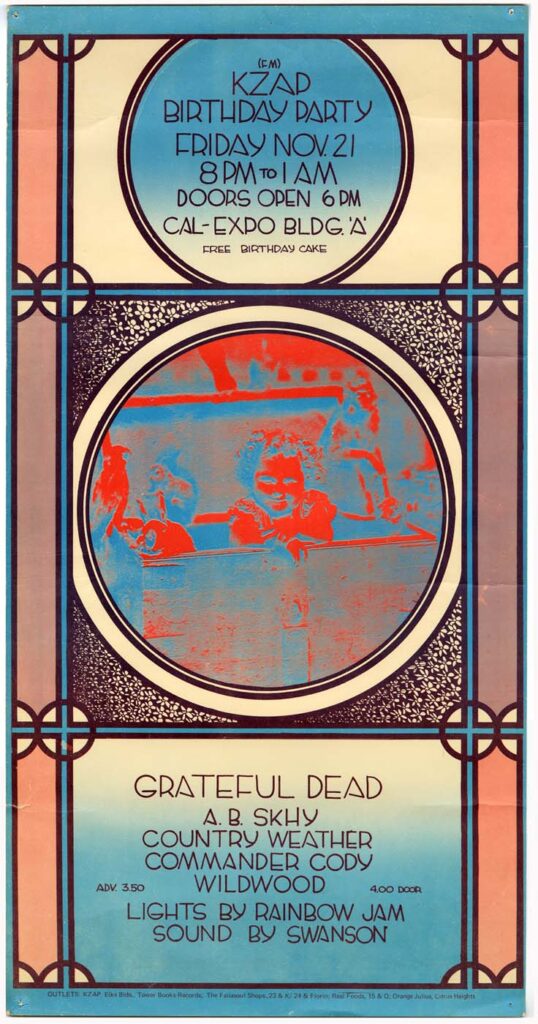
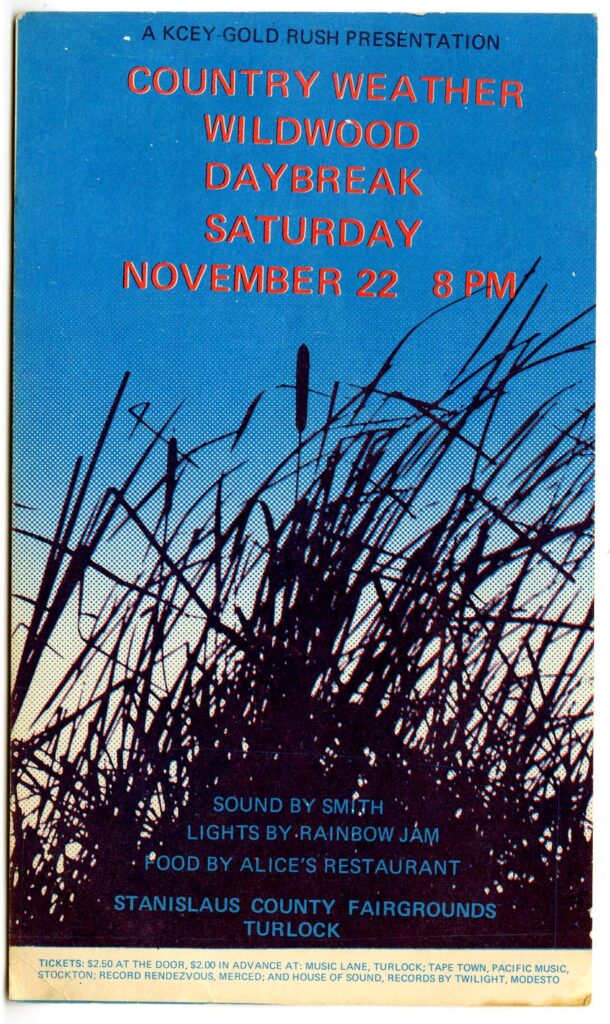
We had released our single ‘Plastic People’ / ‘Swimming’ pretty early on while we were finding our mojo as a live band. It did not take long for us to evolve into a formidable, kick-ass live act. We had a following in the Central Valley, in towns like Modesto, Turlock, and the Sierra Foothills. Oddly, those towns were more enthusiastic about harder rock than Stockton. Stockton seemed to have a more folky, mellower, hippie musical vibe in the late 60s and early 70s. Also, the other towns were more welcoming of music in general. The Stockton city government and police were always trying to cause problems with the rock music scene.
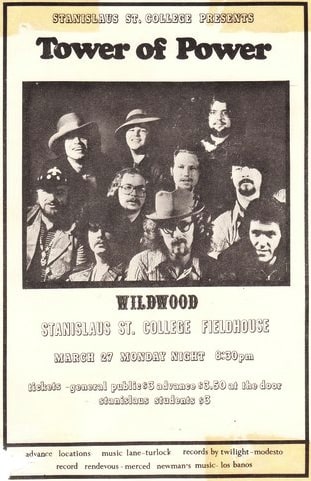
Frank Colli: Steve Miller, Ike and Tina, Tower of Power, etc. Shows we promoted with a backer and opened. We had our share of standing O’s. No covers. All originals.
Let’s talk about your songwriting process. Was it a group effort or did individual members bring their own songs to the table? Who wrote most of the material? Was it something that came naturally, or did you have to wrestle with it?
Mark Stephen Ross: The songs generally came about by jamming on a chord progression or a riff. John was good at creating signature guitar riffs. My goal with the writing was to make the songs go somewhere interesting. Chord progressions, arrangements, and melodic instrumental hooks that the vocal could play off of. With Frank, that was easy. Whatever chords I would throw at him, the first thing he sang was always good, melodically and emotionally.
Aside from the lyrics written by William Chalker, Frank wrote most of the lyrics. The only exception is ‘The Weasel’, which I wrote.
I do not remember the jamming or writing process being difficult. It all seemed to flow naturally as a collaboration. Sometimes it would click right in and we would have something, or we would revisit an idea at the next rehearsal. Sometimes it would not go anywhere, and we would just move on to the next thing.
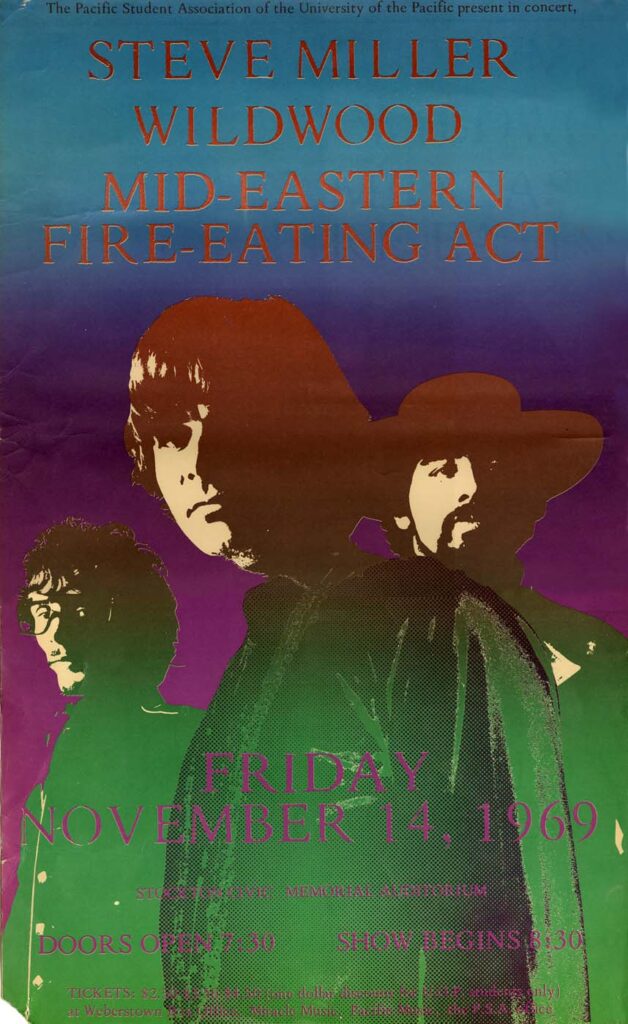
Frank Colli: We started most projects with a riff of some sort that caught us, and we built from there. I would start vamping some weed-induced lyrics until something, again, caught us. On we went. I wrote the lyrics to three songs, as I remember: ‘Plastic People’, ‘Swimming’, and ‘Free Ride’. We all did our part to build a song around the stories. I believe that was Wildwood in the purest form. That was psychedelic baby, before we started using Chalker’s lyrics and stories.
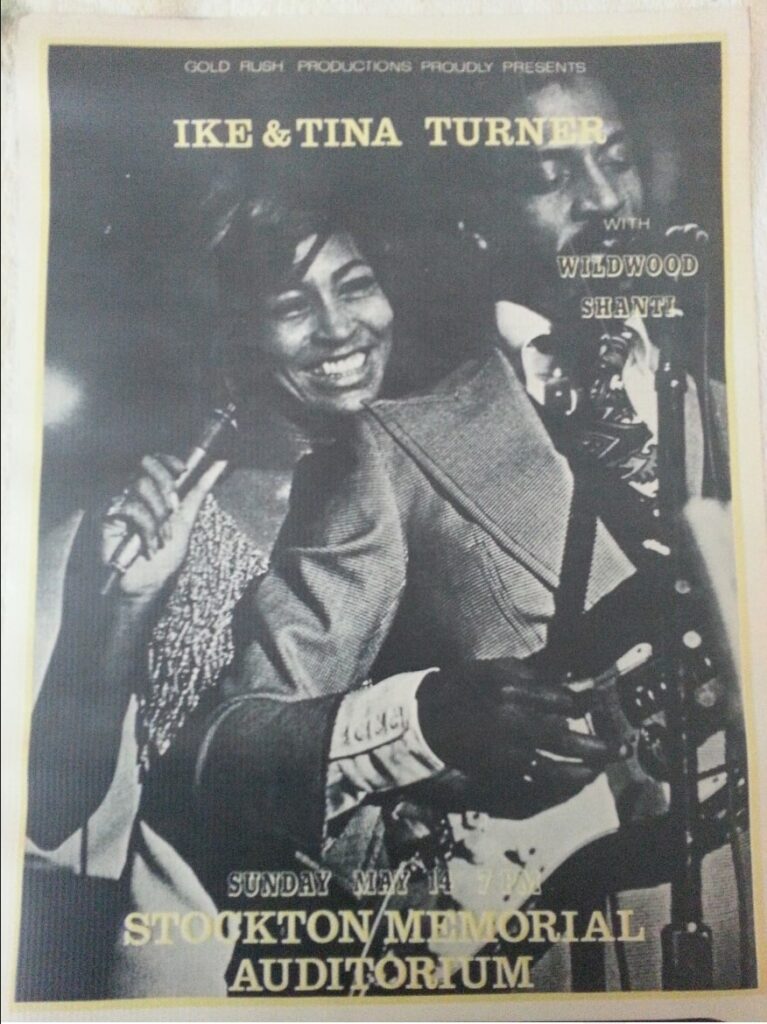
The material you wrote: was it all about personal expression, or were you trying to reflect what was happening in the world at that moment? Was it more about creating a feeling, or were there themes or messages you wanted to get across?
Mark Stephen Ross: Frank wrote the lyric to ‘Plastic People’ about people who were bullshitters living lies. He can explain the rest.
Chalker’s lyrics were another thing altogether. He wrote some crazy, evocative stuff: ‘Steel Cathedrals’, ‘Choo Choo Thunder’, ‘Durango’, ‘Wildwood County’, and ‘Mary Midnight’. The imagery was very dark, twisted, and really inspiring. Chalker would send us packages in the mail from San Francisco with lots of lyric ideas. We would just choose one that resonated with us, and with the lyric as inspiration, build the song around that. Chalker recorded rambling demo versions of some of his songs, but we didn’t pay attention to those. We preferred to just see the lyric and take it from there musically. The Wildwood sound got considerably darker and more intense with Chalker’s input. With Chalker’s lyrics, it became about creating a particular, usually more foreboding feeling.
Frank Colli: ‘Plastic People’ was my hippie anthem, I guess. For me it was seeing the written word of a phrase, a book title, something to start the story with.
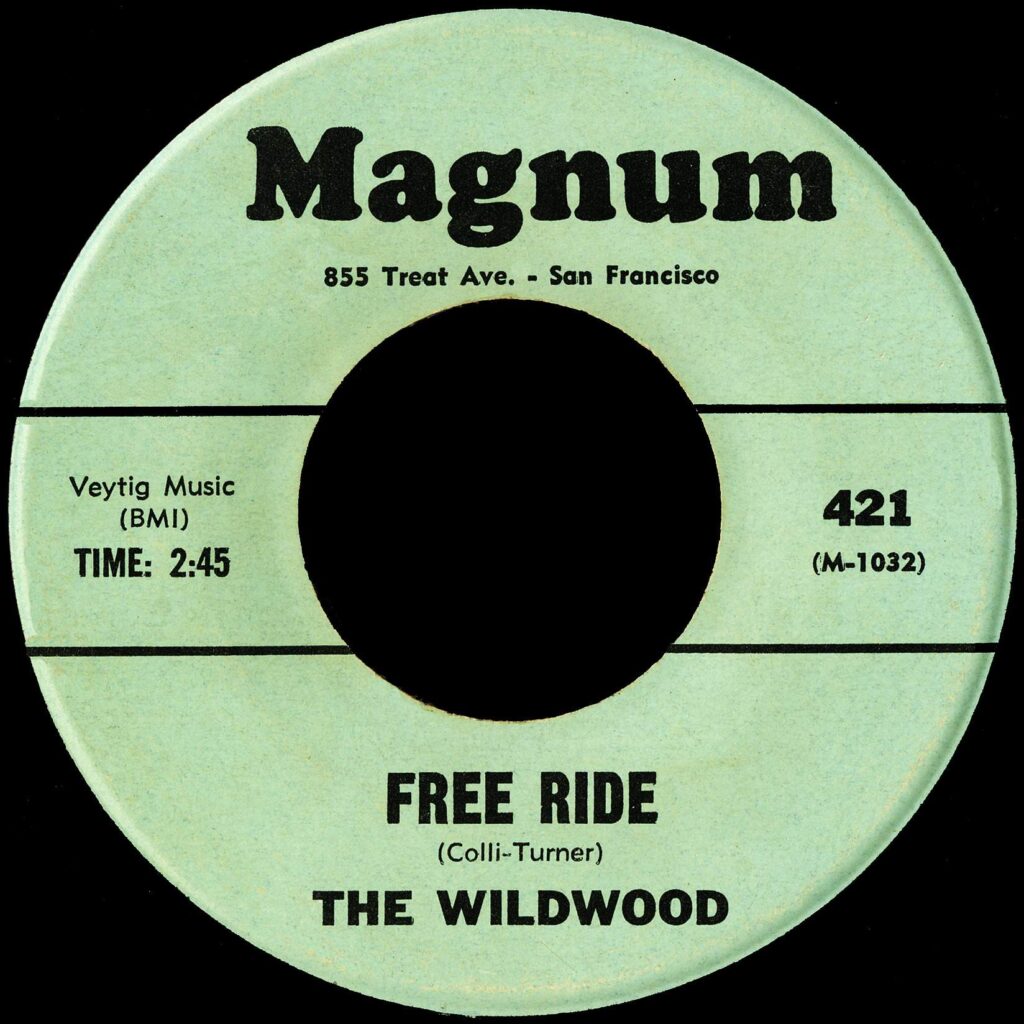
You’ve talked about your early influences—things like garage rock, blues, and British Invasion. How much of that came into your sound? Was there a turning point where you realized you were onto something completely different, or did you always feel like your music was a fusion of those influences?
Mark Stephen Ross: I mentioned earlier a bit about our collective influences. Garage rock, blues, soul, R&B, British Invasion, classical music. As years went on, we got influenced by some of the newer music out there: Santana, Allman Brothers, Deep Purple, Lee Michaels, Led Zeppelin, CSNY, Leon Russell, Joe Cocker. Really too many to mention, but I was always listening and absorbing new musical trends and sounds. I think that any band’s music, unless it’s one person’s vision, is a result of a confluence of the styles and influences of the members involved. We went into it as a shared vision between the four of us, wherever it might go. I do believe that, in the process, we came up with something original.
Frank Colli: Steppewolf, The Doors with the Vox. I had a mature voice for a young guy. I was compared to Cocker and David Clayton Thomas. I didn’t know how to sing yet. Was screaming my lungs out.
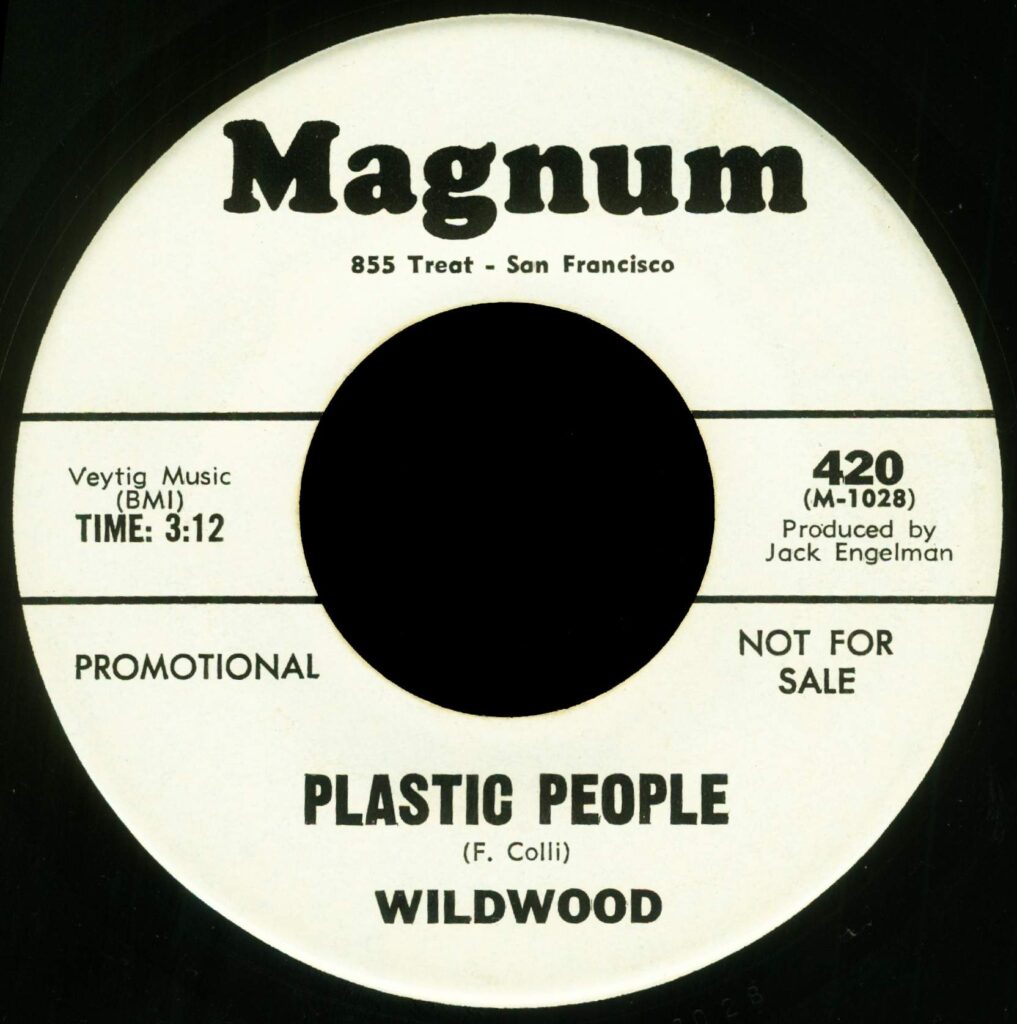
What about the ‘Plastic People’ and ‘Swimming’ tracks? What was the motivation behind those? Did you go into the studio knowing you were going to create something that felt like a snapshot of the time, or was it more of an experiment?
Mark Stephen Ross: Those were the first two songs we created together. It was experimentation in that we were reaching out to find our style. Frank brought finished lyrics for both, and we created those songs by jamming and going back and forth with musical ideas. We went into the studio and played the songs down as we wrote and rehearsed them.
Frank Colli: I wrote those lyrics, brought them to the table, and we built the music around them. Swimming I sang as an ad lib to the riff John had started playing as I remember, and we went from there in practice.
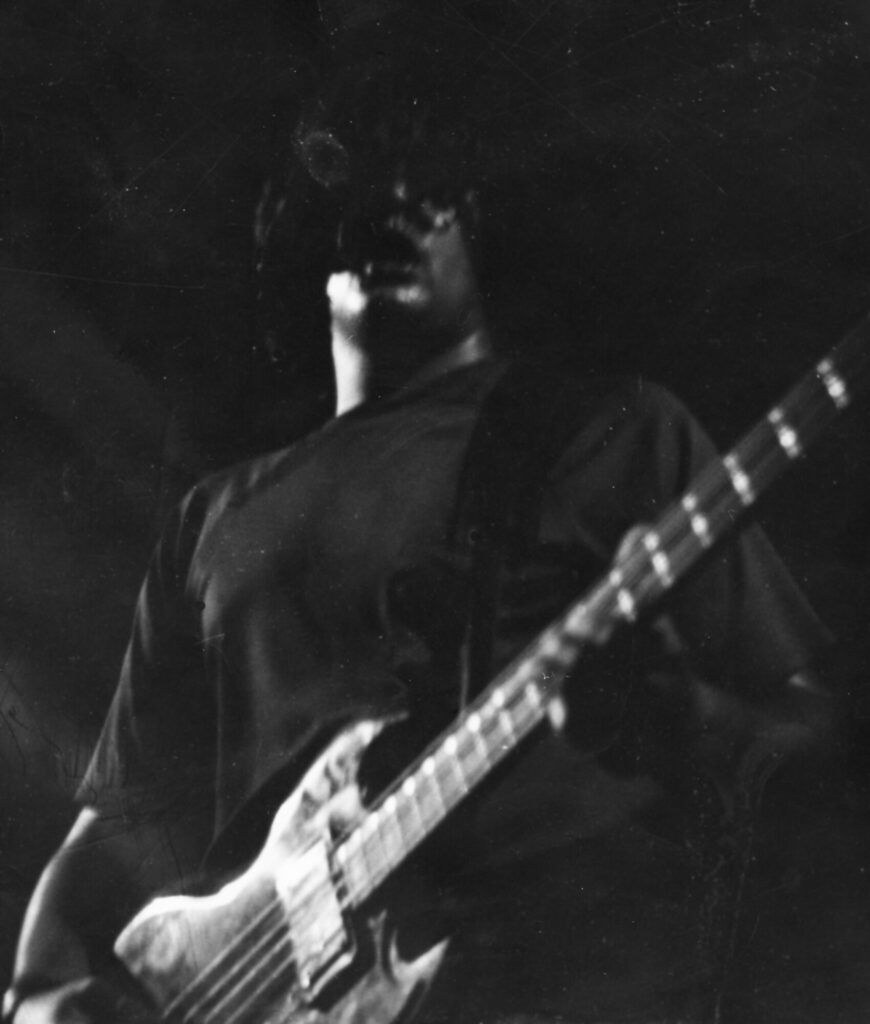
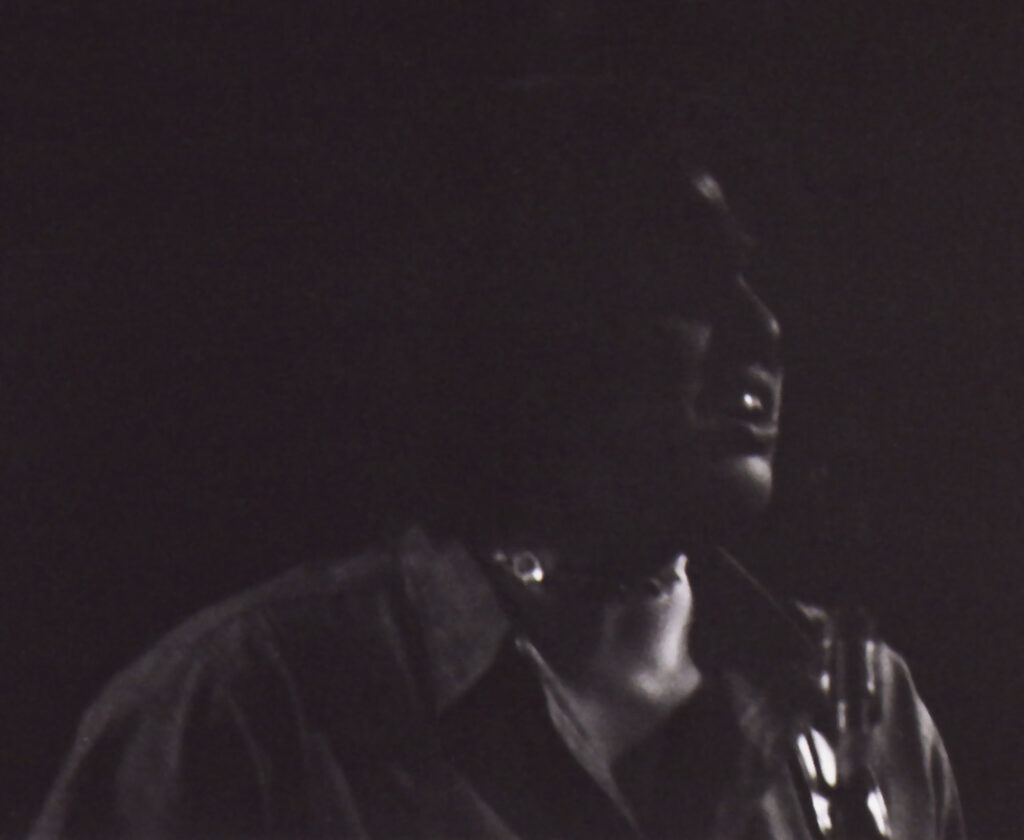
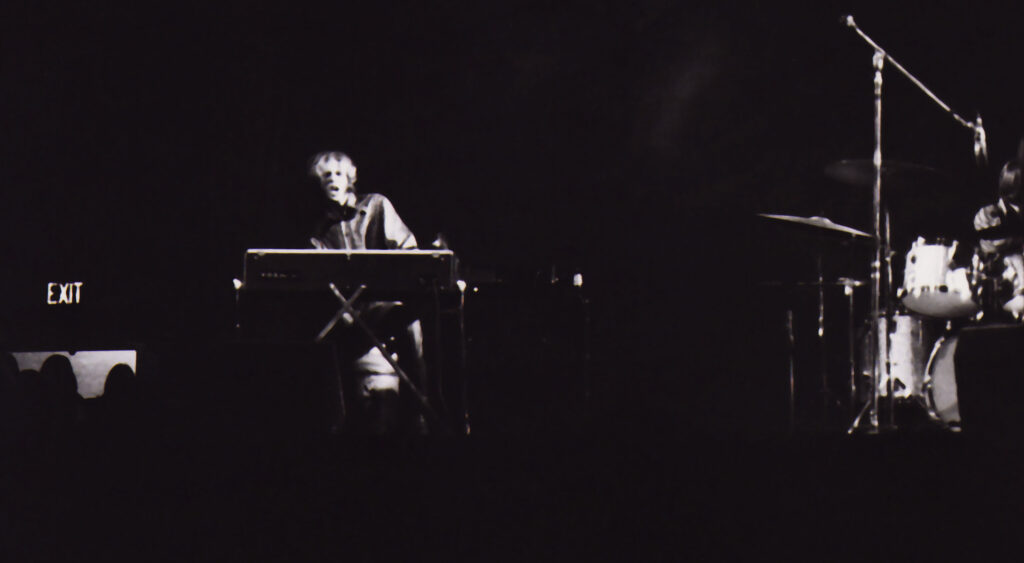
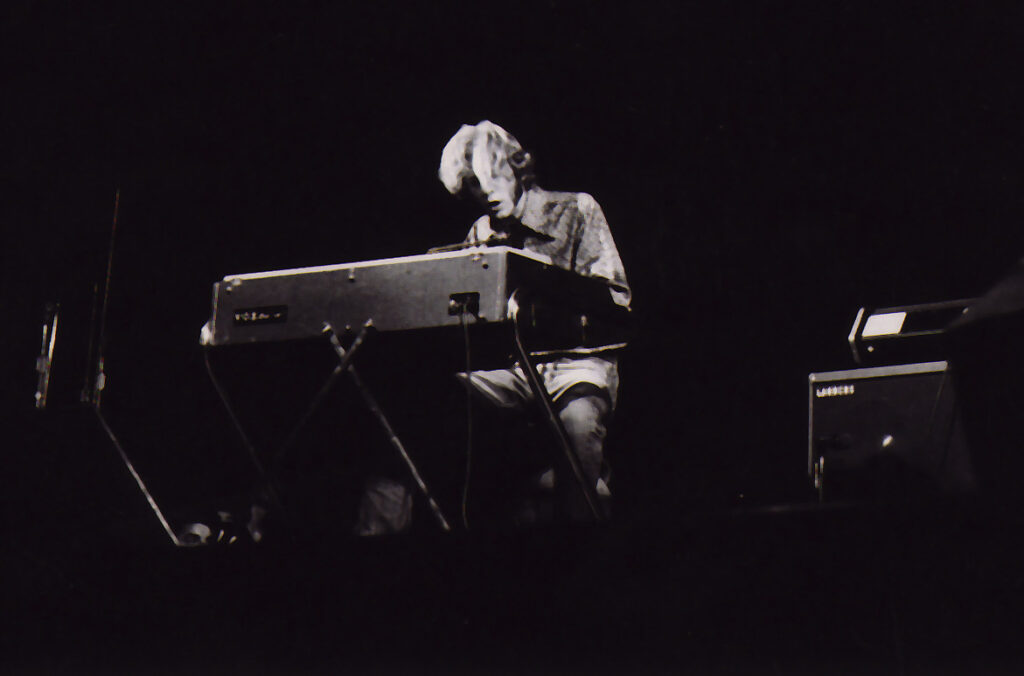
The ‘Plastic People’ / ‘Swimming’ single and ‘Free Ride’ / ‘Wildwood Country’ single—tell me about the recording process. Who was behind the sessions? How did you get into the studio? Was there a producer you trusted, or was it all hands-on?
Mark Stephen Ross: We recorded at Max Weiss’s old Fantasy Records studio on Treat Avenue in San Francisco. Bob Zachary was responsible for the introduction to Max. We had recorded some of Bob’s songs there with Zephyr Blue, but I don’t remember much about those tracks or what became of them.
Max had sold his share of Fantasy Records to Saul Zaentz, who built a new studio in Berkeley and moved forward with Fantasy Records. With Fantasy, Max had recorded Lenny Bruce, Odetta, Bola Sete, Cal Tjader, Creedence Clearwater Revival, and Vince Guaraldi. Max still managed Guaraldi and was instrumental in getting him the job of doing the musical score for all of the Peanuts television shows. One day Vince came into the studio and we got to meet and jam with him. He played piano and I played organ. That was a rush.
Max engineered the ‘Plastic People’ / ‘Swimming’ session, we self-produced, and from then on, we engineered our own sessions while Max played crossword puzzles in the office upstairs. Whoever was closest to the studio door would press record in the control room, then run back in and we’d count off and play.
Max’s philosophy was to sign an act, give them as much studio time as they wanted, then see how ambitious they were about promoting themselves. To say he was hands-off is an understatement. Still, without him, we would never have had the chance to record as much material as we did.

Frank Colli: ‘Plastic People’ was just an idea for a story and I wrote it down. ‘Free Ride’ I had just got a 64 Harley Pan Head, my first bike. I was being chased by a sheriff coming out of the San Andreas foothills, taking a back way home. I had a couple of pounds of weed with me. I wrote ‘Free Ride’ a bit after that. ‘Swimming’ was written and created, as I said previously, in rehearsal.
Who was the label behind the singles? Did you have any expectations of getting airplay, or was it more about making the music and seeing where it went? Do you remember any moments of real satisfaction when you first heard the tracks on the radio, or was it all a blur?
Mark Stephen Ross: Max started a couple of labels called Magnum and Onyx. He signed us to the Magnum label, and our first session was ‘Plastic People’ / ‘Swimming’, which he released as a 45 single. I think we expected that Max would help get us airplay, but Magnum was a small label and we soon realized that promoting the record was up to us. We got to radio stations in the Central Valley and the airplay was mostly regional, although we did do an interview on San Francisco FM radio station KMPX. Hearing the song on regular rotation on the local Stockton stations was exciting, and it’s always a rush hearing your song on the radio for the first time.
Frank Colli: We never had a load of airplay. So any we did get, we were stoked. Jocks were getting hundreds of 45s a week to listen to.
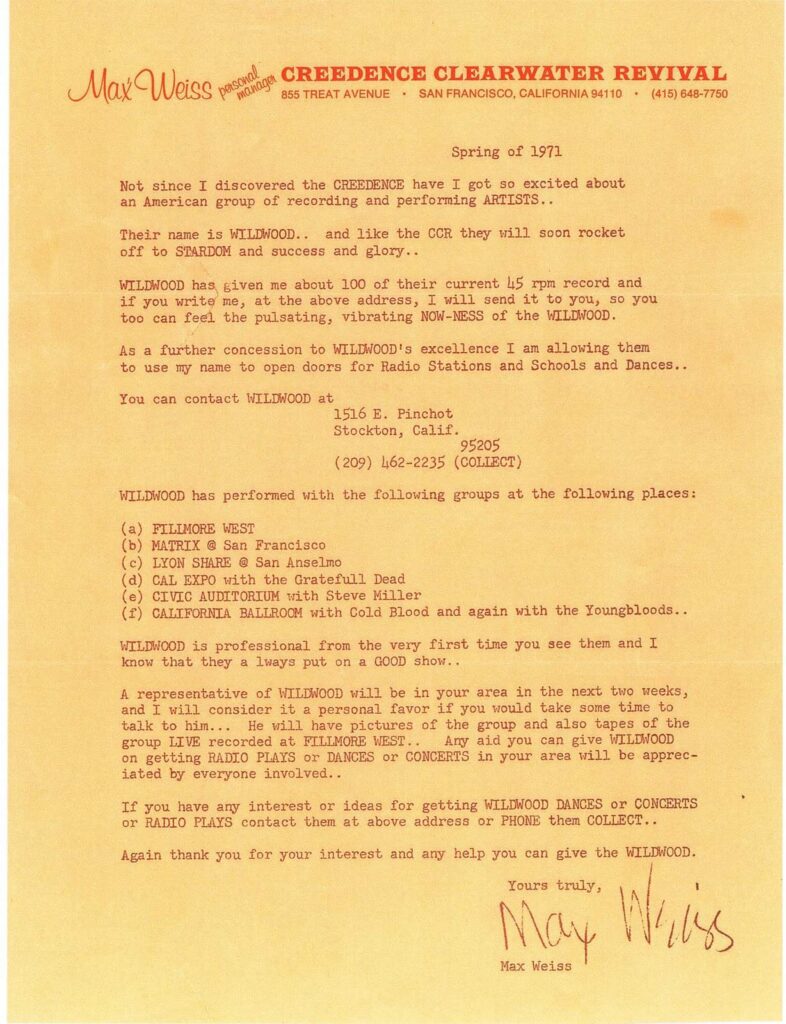
Looking back at those singles, do they still hold up for you today? How do you feel about those songs now? Was it a snapshot of who you were, or do you feel like there’s a part of the Wildwood story that wasn’t captured in those tracks?
Mark Stephen Ross: I think that they hold up pretty well. Max’s studio had a very raw and grainy sound, so the recordings weren’t exactly pristine, but I guess that adds to the garage rock appeal. Those records were a snapshot of where we were in our growth at that time. Both singles were some of our earlier material. ‘Wildwood County’ was the first song we did with Chalker’s lyrics. ‘Free Ride’ was a staple of our live shows throughout the life of the band.
Frank Colli: It was psychedelic baby. More verb on the vocals, hahaha! A producer and a vocal coach for me. We could have been contenders.
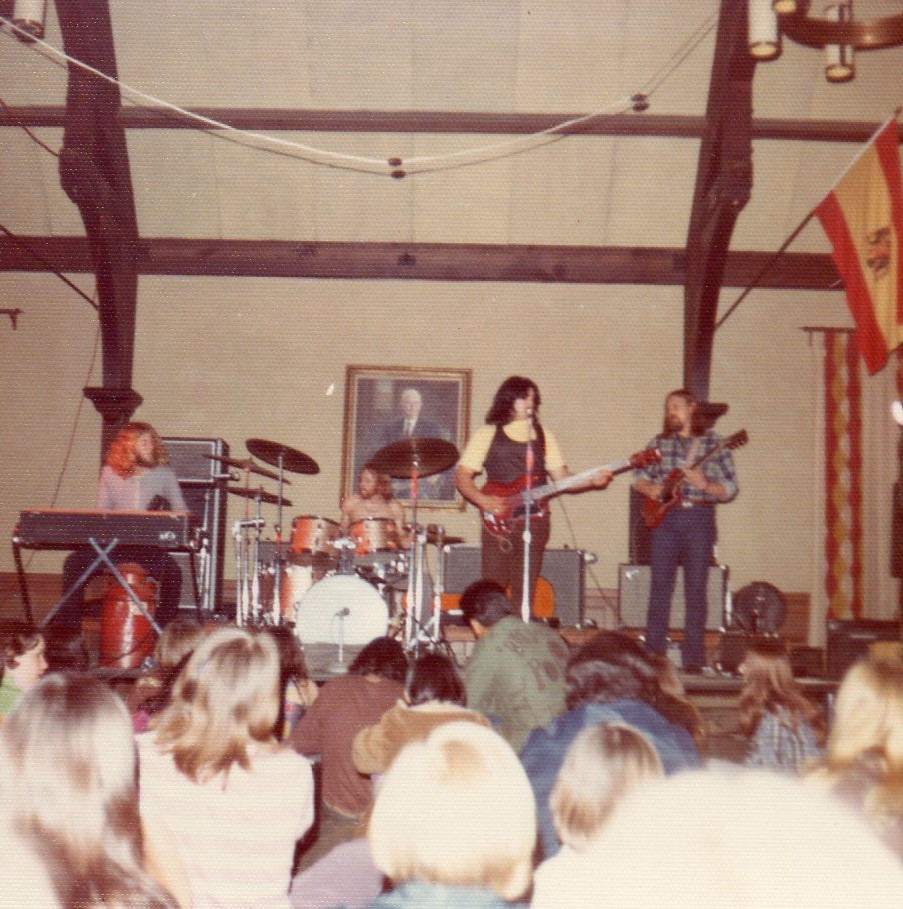
The Guerssen reissue what are your thoughts on it? How does it feel to have your old material brought back to life for a new generation? Can you walk me through each of the tracks and share what they mean to you now, in hindsight?
Frank Colli: It’s fucking awesome, are you kidding me. No money out of pocket and you’re on vinyl for life out there. Sweet… life is.
Mark Stephen Ross: Crazy to think that this all happened over fifty years ago. We were lucky enough to come up with these tracks after all these years, most of them not original masters, but copies. It feels great to have these songs out there for people to enjoy now, and for me it’s a time capsule. We were very happy when Guerssen approached us about releasing a vinyl LP, and now it’s done well enough for them to do a second pressing, so we love that.
‘Plastic People’
The beginning of the band and the first song we wrote together. Later on we didn’t play it much in our live shows, I think because we felt we were evolving and coming up with new songs, many of which were perfect for the stage. I still enjoy listening to this, though. The descending line into the chorus still makes me smile.
‘Mothers’
I don’t remember much at all about the recording session for this one. A Chalker lyric, typical dark subject matter. I’m guessing it’s about the horrors of war. Listening to it now, I really like Frank’s bass line in the chorus. It really propels the song forward. The instrumental intro of this track was recently used in an internet commercial for Vans sneakers.
‘Mary Midnight’
One of the last songs we wrote, and the last one we recorded at Max’s Treat Avenue studio. A really cool Chalker lyric about a woman who grieves for her sailor, or maybe pirate, who sailed off to conquer foreign lands never to return. I used a classical approach with the organ. At this point I was making a push for the band to evolve into more sophisticated songwriting and arranging.
‘Choo Choo Thunder’
This is definitely a drug song. Chalker loved his pills, uppers, downers and in betweeners. He used to carry baggies of pills with him, all different shapes and colors. Chalker’s lyric uses a fast-moving train as a metaphor for getting high (“I get there quick, I got the speed”). The groove and attitude reflect the relentless forward movement of the train. This was one of our favorite songs to do in the live shows.
‘Free Ride (Hammond)’
A rocking track. This one came about from jamming on John’s guitar rhythm figure. This was originally recorded earlier with Vox organ, but we decided to re-record it with the Hammond B-3. Sometimes you can’t capture the same thing again, but this one turned out great. Another of our favorites for the live shows.
‘Wildwood County’
One of the few Wildwood tracks on which I played piano as well as organ. Chalker sent us this lyric about an outlaw as a tribute to Wildwood. I still laugh when I hear the line “…to lose that jingle jangle of my ball and chain, I chopped off my left leg, ha, ain’t that lame.” Basically a minor blues, I always liked this one.
‘Gotta Keep Movin’
I don’t remember much about the recording of this. It’s one of our earlier songs and we didn’t play it much live. I think we just moved on and it got lost in the shuffle of newer material.
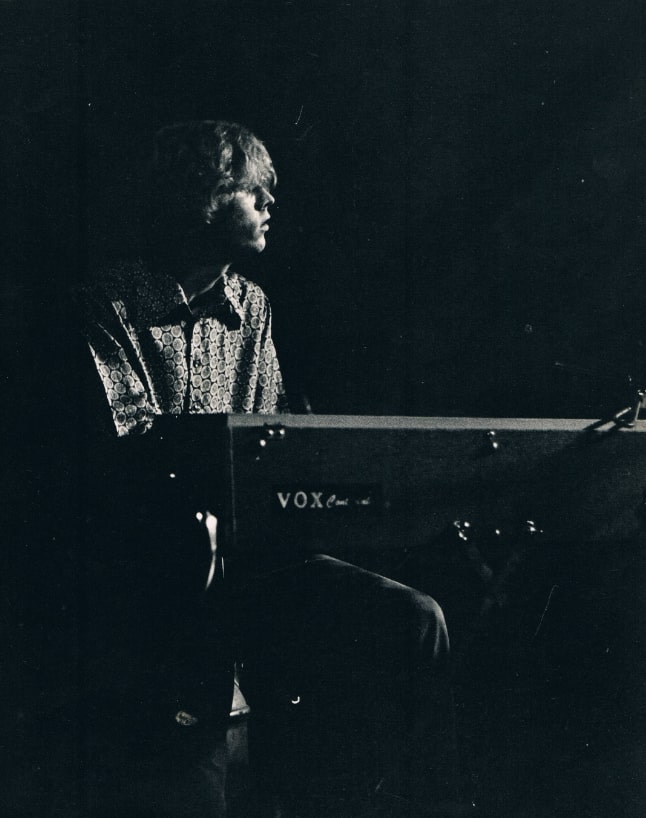
‘Swimming’
The beginning of our creative output. Along with ‘Plastic People’, this was one of the first songs we wrote together. I had fun with the organ riffing off the guitar rhythm between the vocal phrases. I still really like this one. Frank wrote the lyric, I think, about a breakup with a girlfriend.
‘Steel Cathedrals’
I think I can speak for all four of us in saying this was one of our favorites and definitely one of our better recordings. Our most foreboding and sinister sounding track, I think we played this at every live show from the time we wrote and recorded it. A great Chalker lyric about madness and mental anguish, someone living in a personal hell. In other words, a really positive and uplifting song, haha.
I remember the session for this one. Max had a Rhodesian Ridgeback dog named Freako who hung around the studio. When we were recording the track, Freako was right outside the studio door and barked in deep reverb just at the right time during the intro to the song. You have to listen closely to hear it because it is almost inaudible, but you can hear it on the second beat of the sixteenth bar (30 seconds into the track), just before the song breaks open. I thought it was perfect. It sounds like the hound from hell.
The recurring rhythmic organ break was inspired by Santana. I loved the original lineup of that band; they were on fire live, and back then I saw them in the Bay Area as often as possible.
‘Probing the Secrets’
This is one of our earlier songs, written around the opening organ figure and chord progression. Frank wrote the lyric. Stylistically, this was not typical of where we were headed—just kind of an experimental detour. I like it, but it did not really fit in the live shows.
‘Durango’
This was one of our later tracks with a cool Chalker lyric about a gunslinger named Durango. “I hear the prairie wind howling…” “Durango died before his body hit the floor…” I think we really captured the right desolate atmosphere, right down to Tim’s military snare.
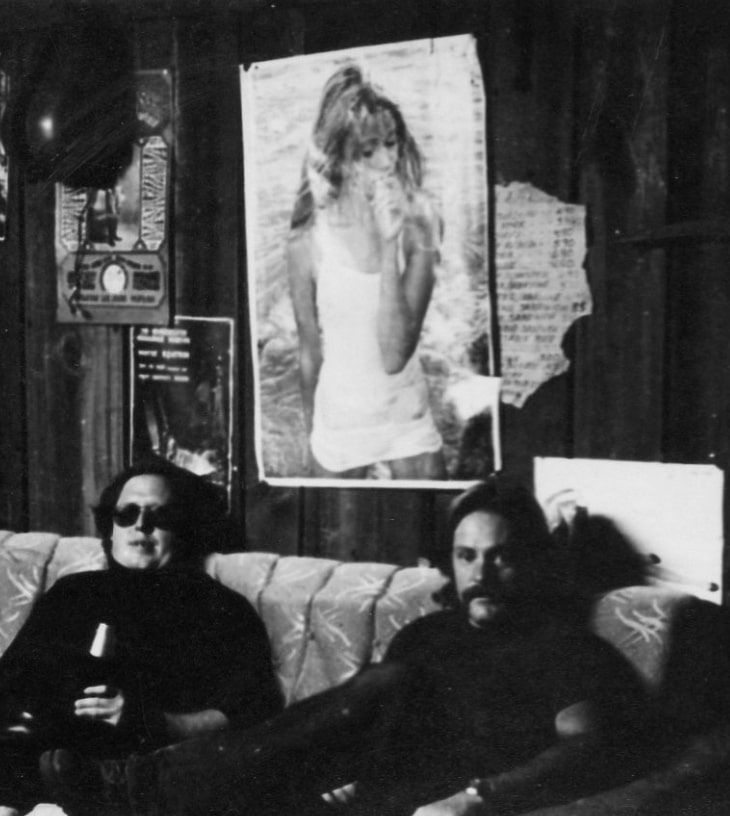
‘Mister Wild Love’
A straight ahead rocker, lyric by Frank. We had fun with this in the live shows.
‘The Weasel’
This was an experiment in trying different grooves, chord progressions, and styles. This is the only Wildwood track that I wrote the lyric to. Not one of our better efforts, this one was forgotten not long after we recorded it.
‘Knock on Any Door’
This is my favorite of our later tracks. As a song, it is more fully realized than some of the earlier stuff. It is interesting rhythmically and there is an R&B vibe in there, both musically and in Frank’s vocal delivery. Along with Lonesome Roads, this is one of the last songs we wrote and recorded.
Mercury Records A&R guy Russell Schmidt brought us into Wally Heider’s studio in San Francisco to record three songs for a possible record deal with Mercury. We recorded ‘Knock on Any Door’, ‘Lonesome Roads’, and a remake of ‘Steel Cathedrals’. Unfortunately, Mercury passed on us and the deal did not happen. The sound quality at Heider’s was definitely an improvement over Max’s studio on Treat Avenue.
‘Lonesome Roads’
I like this track. I had been listening to a wide variety of music at this point and was eager to get the guys to try new things musically. Inspired by The Band, a bit of Buffalo Springfield, and maybe a touch of Leon Russell, this was a departure for Wildwood. This was one of the rare Wildwood songs on which I played piano as well as organ. One of the last tracks we ever recorded.
‘Steel Cathedrals (Mercury)’
This was a remake of Steel Cathedrals that we recorded at Wally Heider’s. Sometimes it is not a great idea to try to capture the magic of the original recording, and this was one of those times. Although the sound quality at Heider’s was better, this track feels rushed. Russell Schmidt had Tim overdub a double time hi-hat part that is too loud in the mix, and I just find it distracting. I much prefer the original recording.
‘Free Ride (Vox)’
This is the original version of ‘Free Ride’. I really like both versions, this one with the Vox organ and the one we recorded later with the Hammond B3. It is hard for me to choose between them. This one with the Vox organ definitely has a more garage band vibe.
‘Blue Eyed Woman’
This is a basic slow blues jam, and there is nothing very original or remarkable about it. It is okay, but it does not stand up to a lot of the other material. I do not believe we gave it another thought after we recorded it. I did not want this track included in the original Frantic CD release, but Joey D wanted to release everything we had.
The Mal-T’s – ‘Here to Stay’
This was originally the B side of the 45 single, with ‘Stand Up Today’ getting most of the radio airplay. We recorded this at Stereo Masters studio in Hollywood. Here to Stay has gotten more attention in recent years since appearing on the ‘Pebbles Vol 9’ compilation CD. This track rocks a bit more than ‘Stand Up Today’. Both tracks are British Invasion inspired.
I played a Vox Continental organ on this track, and the sound I used for the solo was inspired by The Tornados hit ‘Telstar’ from the early 60s. I always loved that song and the sounds of the keyboards and guitars. Lots of ear candy there.
The Mal-T’s – ‘Stand Up Today’
This song got regional airplay in the Central Valley in 1967. Both songs on the single were written by singer Bob Zachary and arranged by the band. This was my first experience hearing myself on the local Stockton radio stations KJOY and KSTN. Very exciting for a high school kid.
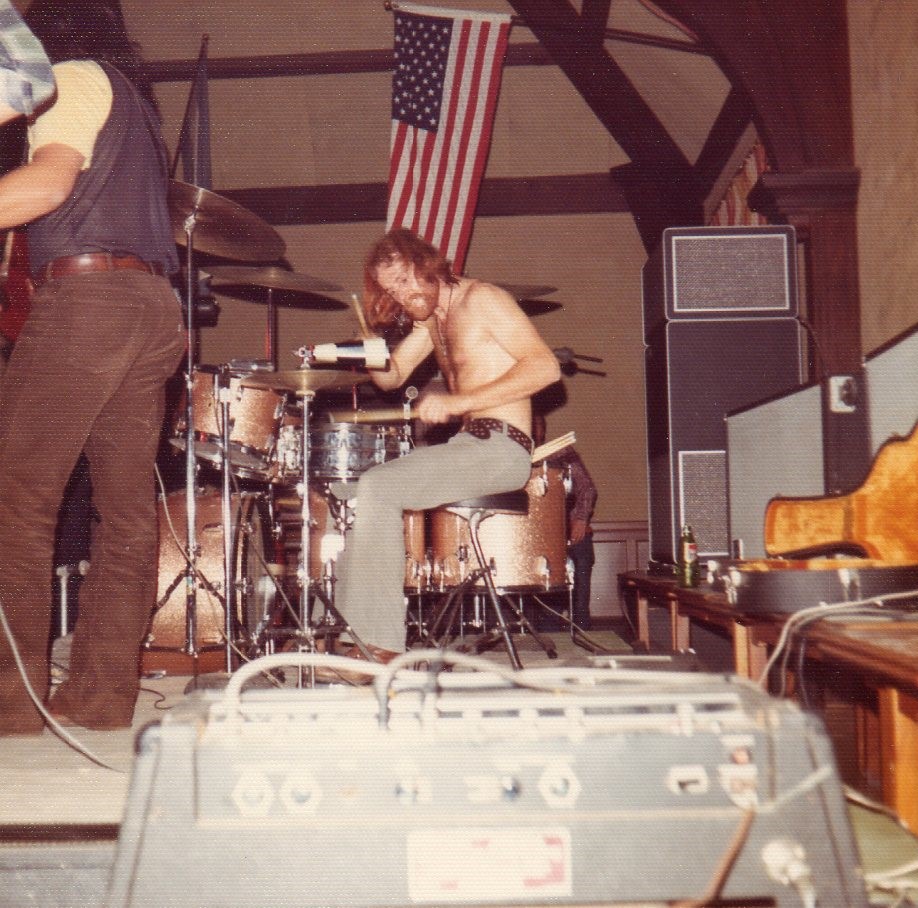
What are the most memorable gigs you have ever played? Was there one show that stands out where everything clicked and you thought, “This is why we do it”? Or was there a particularly crazy gig that felt like the band was just tearing through reality?
Mark Stephen Ross: There were so many good shows over those years, it is hard to think of just one standout. Some of my favorites were Fillmore West twice, opening for the Grateful Dead at Cal Expo in Sacramento, opening for The Doobie Brothers at the Chateau Liberte in the Santa Cruz mountains just before their breakout album Toulouse Street was released. We did shows with Ike and Tina Turner, Steve Miller Band, Tower of Power, Cold Blood, Youngbloods, and many other groups. They were all fun.
Frank Colli: Grateful Dead KZAP Radio birthday party in Sac Town.
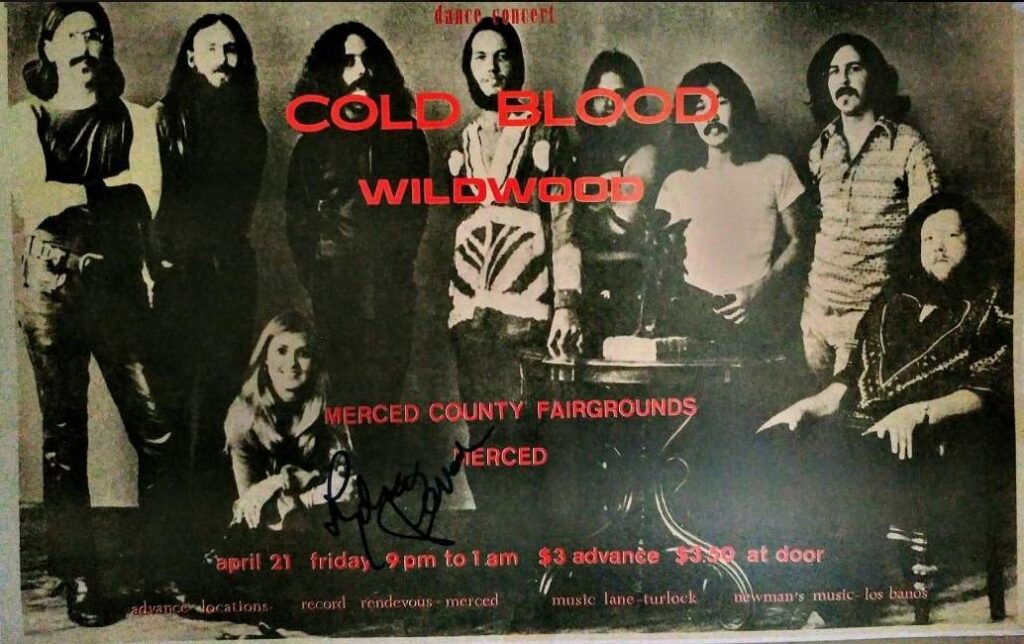
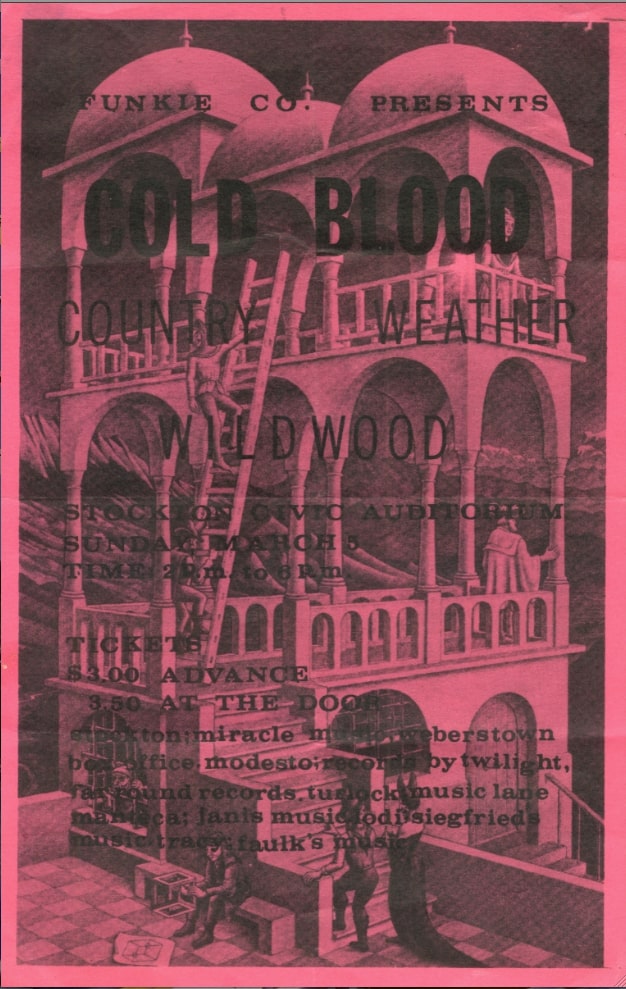
What about the most disastrous gig? The one where everything went wrong. Was there a moment when you realized that sometimes the show must not go on? I am talking about technical failures, bad crowd reactions, the works.
Mark Stephen Ross: The worst gig I can think of was when we played a dance at my high school in Stockton. I had graduated a couple of years before. While we were playing, a guy down in front of the stage started taunting Frank, flipping him off and calling him names. This guy thought he was a badass and was trying to impress his buddies. Frank put up with it for a while, but then he finally jumped off the stage and started beating the guy up. Frank got ejected from the auditorium, and we had to finish the gig without him, with me on lead vocals. That was not an ideal situation for me or anyone else. We got a good laugh about it later. That guy had it coming.
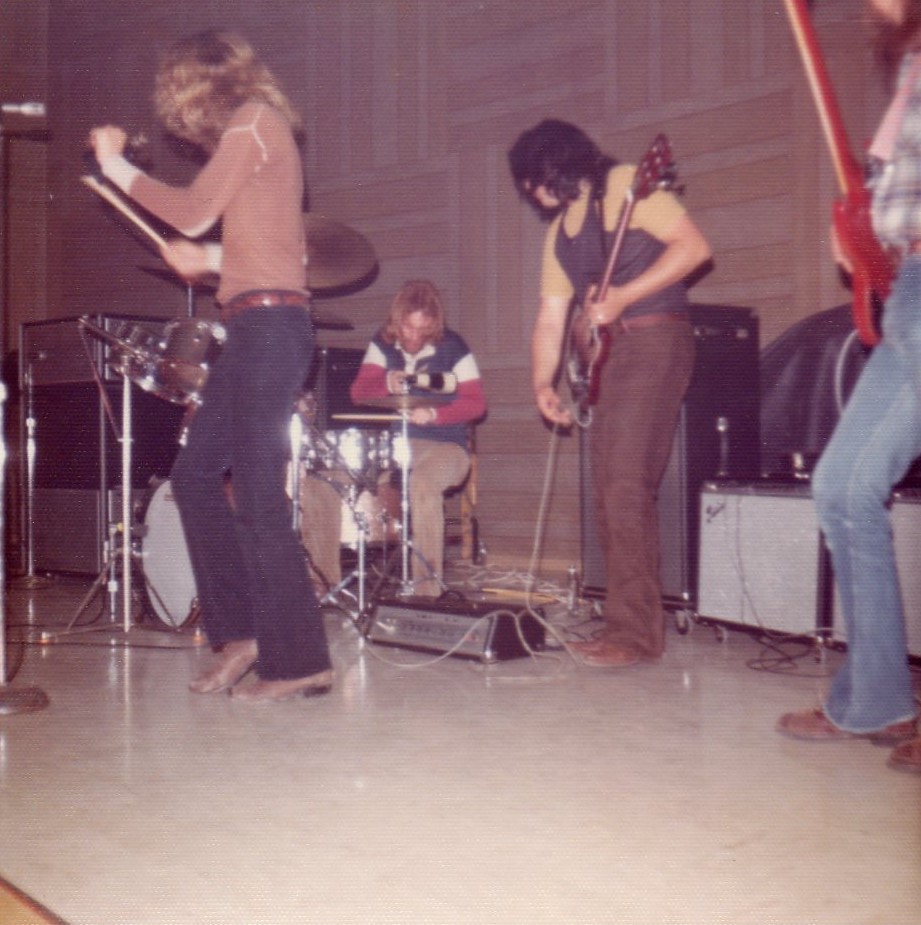
When you think back on those Wildwood days, what are the best and worst memories that still haunt you? Is there a single moment that sticks with you, a time when everything seemed perfect or a time when everything fell apart?
Mark Stephen Ross: It is difficult to narrow it down to a few of the best memories. There were four years of them, from when we were finding our groove with each other as a band to when we fully came into our own as a kickass live act.
Looking back, we were lucky to have Max’s studio. He was very generous, letting us record pretty much whenever we wanted. The worst moments were towards the end when I felt I was moving apart from the band.
Frank Colli: It was time to move on. We were stuck and over as a group. I needed more and so did Mark. And here we are.
Why did Wildwood break up? Was it inevitable or did something specific happen that led to the end of the band? Were the members just worn out or was there a clash of creative visions?
Mark Stephen Ross: In 1972, I felt that I was drifting apart from the band. I had, for better or worse, been advocating to expand our musical and stylistic palette. I was hearing so many new musicians and groups coming up that were rocking hard, but they were more sophisticated, more educated, and with serious musical chops. I felt that we needed to progress. It was 1972 now, not 1968, and I did not want the band to be stuck in the past. Some in the band were in agreement with that but not everyone, so I became frustrated, feeling like we were hitting a creative wall. The other consideration for me was financial. John had quit his job to promote the band full time, so most of the money that the band made went to support his family while he did that work. For a while, that was okay with me because I was in college, and we were all collectively trying to make the band a success. But at that point, I needed to actually start making a living at it, and this arrangement was not sustainable. Overall, I just felt it was time for me to move on to new musical experiences, so I quit.
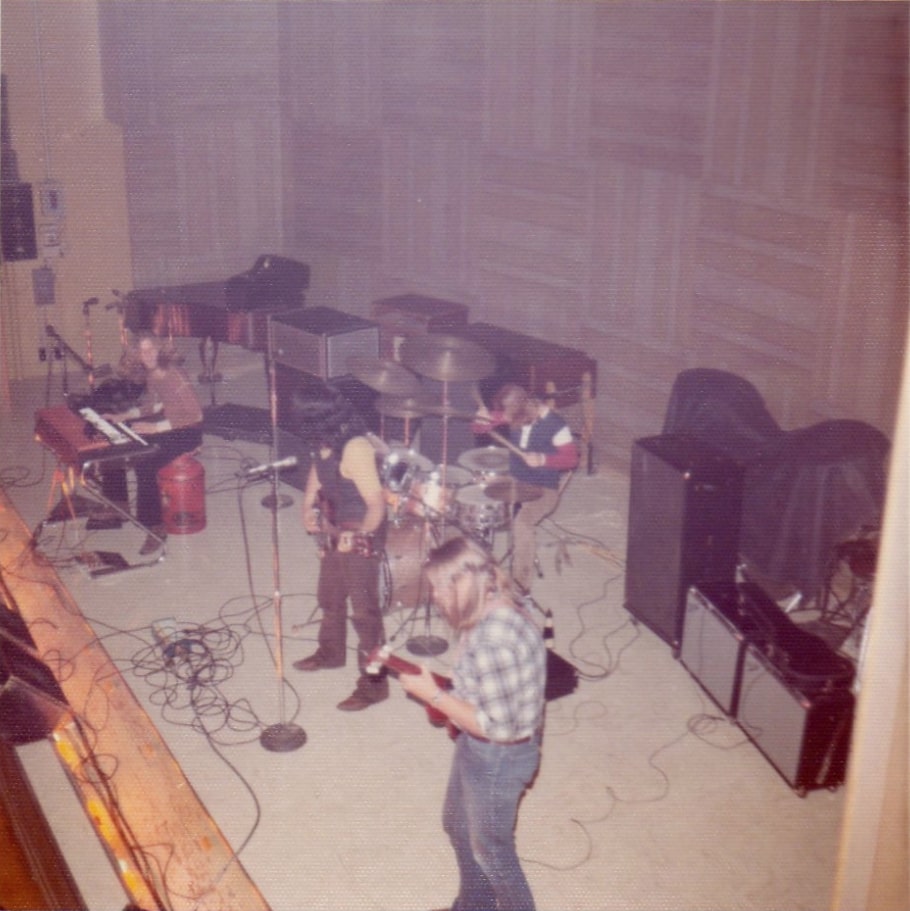
What followed after Wildwood disbanded? Did any of the members go on to other musical projects or did they completely shift gears? Were there any lingering ideas or unfinished songs from Wildwood that later found a home in other bands?
Mark Stephen Ross: Shortly after I quit, I moved to Santa Cruz, then Monterey, California. I played clubs with local musicians and spent from 1976 to 1980 touring and recording as the keyboard player for Mark-Almond.
Frank left the band shortly after I did and spent time living in Hawaii and playing gigs in the Honolulu area. These days he lives in Brookings, Oregon, and is active in the music scene there. John and Tim continued playing together for years in Stockton, mostly as a weekly jam session with various musicians.
I personally did not revisit most of the Wildwood catalog until there was interest from Joey D of Frantic Records and Alec Palao about a CD release in 2012. Alec was the one who found me and introduced us to Joey D. I had not even heard much of the Wildwood material since 1972. Except for the two 45 singles, I did not know that most of the tapes even existed anymore. John’s widow Mikie Turner was instrumental in locating the tapes.
Frank Colli: I was recruited through a Mercury Records engineer into Tom Poole’s band in the Bay Area. They happened to be working with him and were looking for a vocalist. What a circle. Tom lives in Grants Pass and works with Mark once in a while in his band.
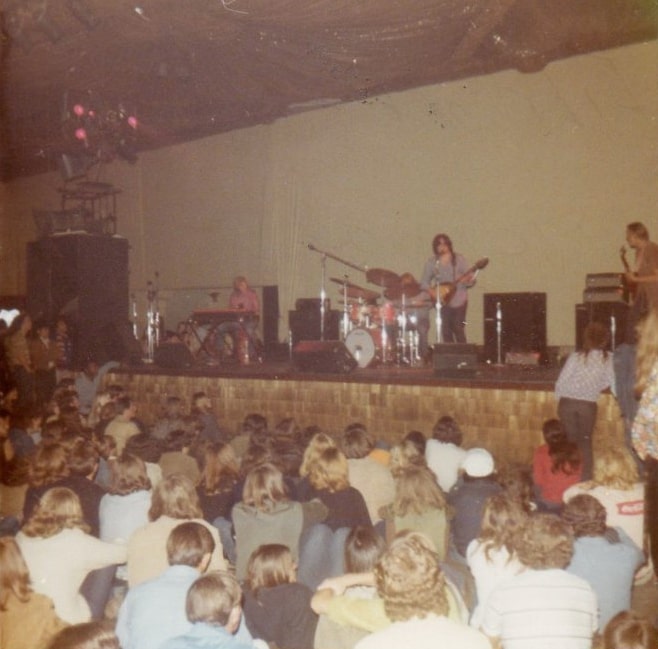
Are there any unreleased Wildwood tracks or material that you are sitting on? Maybe stuff from the time you spent together that did not make it to tape? What about any other musical projects you were involved in before or after Wildwood?
Mark Stephen Ross: There are no more Wildwood tracks. Everything that we recorded has been released over the last thirteen years. There was one idea that we played in our live shows that we never recorded because it was really unfinished, just a boogie jam that we would throw in the show for fun.
After Wildwood, I mentioned that I moved to Monterey, California, and became the keyboard player for Mark-Almond. That was a great gig. I was already a fan of Jon Mark and Johnny Almond from John Mayall’s ‘Turning Point’ album, and when I first heard Mark-Almond’s ‘The City’ on FM radio in 1971, I wanted to play that kind of music. After moving to Monterey, I was studying and listening to more jazz—Chick Corea, Herbie Hancock, Crusaders, Ramsey Lewis, and others. When I was introduced to Jon Mark and he asked me to join the band, I jumped at the chance. We recorded one studio album, ’Tuesday In New York’, and in New York in 1978 we did a live album.
I moved to Los Angeles in 1980 and through the years played with many artists: Delbert McClinton, Brenda Russell, Chuck Berry, Bo Diddley, Ronnie Laws, and there were some one-off shows here and there backing Linda Ronstadt, Carole King, Brian Wilson, Roger McGuinn, and others.
In the 1990s, my focus shifted from playing live to composing multi-genre music for production libraries for placement in television shows and films. I composed everything from action, drama, romantic comedy, sports, and more. I have had music in hundreds of TV shows worldwide, and some films as well.
I began composing for the daytime soap Guiding Light in 2003, and for that I won Emmys in two consecutive years, 2007 and 2008.
My wife Ann Kelly is a singer-songwriter, and it was she who really got me back into playing live again around 2010. We have released two Ann Kelly CDs and are writing and recording more songs all the time. We co-write the songs, and I produce and arrange. We perform regularly with a seven-piece band and also as a duo.
Frank Colli: Not commercially. I live on the Southern Oregon coast as a musical bachelor and perform with two acts. A duo, The Italian Guys, and a band, The Mighty Steelheads. All covers. Excellent players. Check it out at TheMightySteelheads.com.
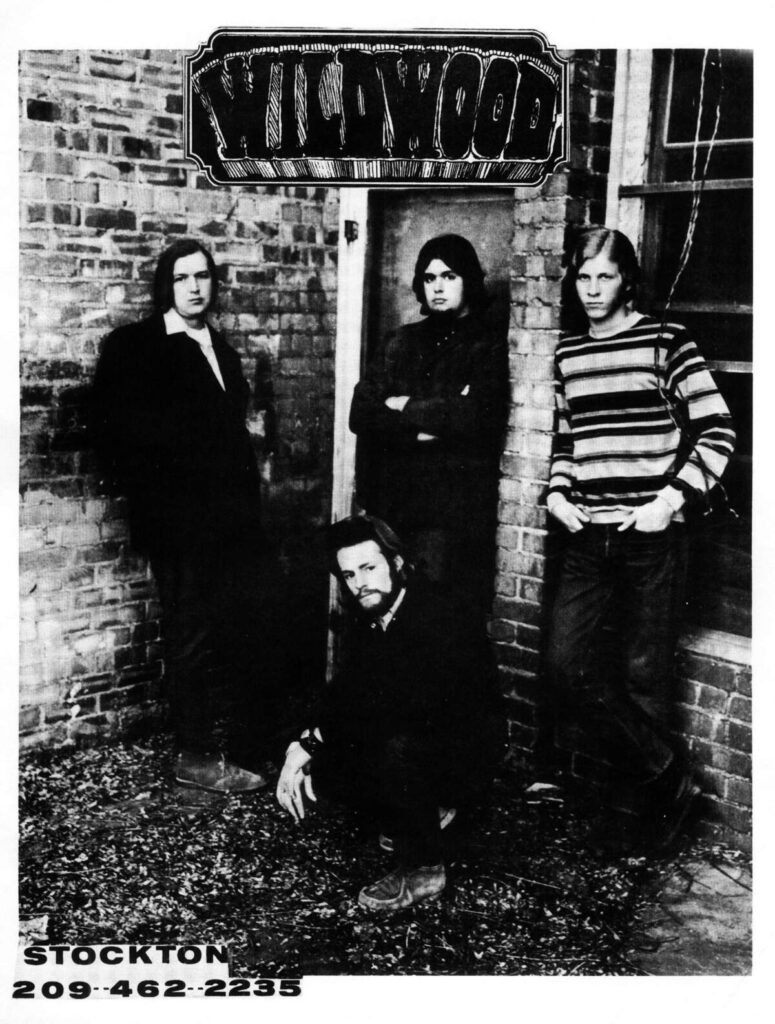
Thank you for taking your time. The last word is yours.
Mark Stephen Ross: I would like to acknowledge the contribution of Alec Palao of Ace Records and Joey D of Frantic Records. Without them, there likely would not have been a Wildwood release at all. The Wildwood journey was a great time in our lives and was our first experience playing concerts to large audiences. Frank, Tim, and I have remained good friends for all of these years, and although John Turner left us many years ago, we are all still close with his wife Mikie.
Many thanks to Guerssen Records and Alex Carretero for the second pressing of the Wildwood ‘Plastic People’ vinyl LP.
Finally, many thanks to you, Klemen, for this interview.
Frank Colli: Thank you, Klemen, for your love of music, the art, and interest in Wildwood the band.
Klemen Breznikar
Guerssen Official Website / Facebook / Instagram / Twitter / Bandcamp / YouTube
Inside Wildwood: An Interview with Mark Stephen Ross & Frank John Colli

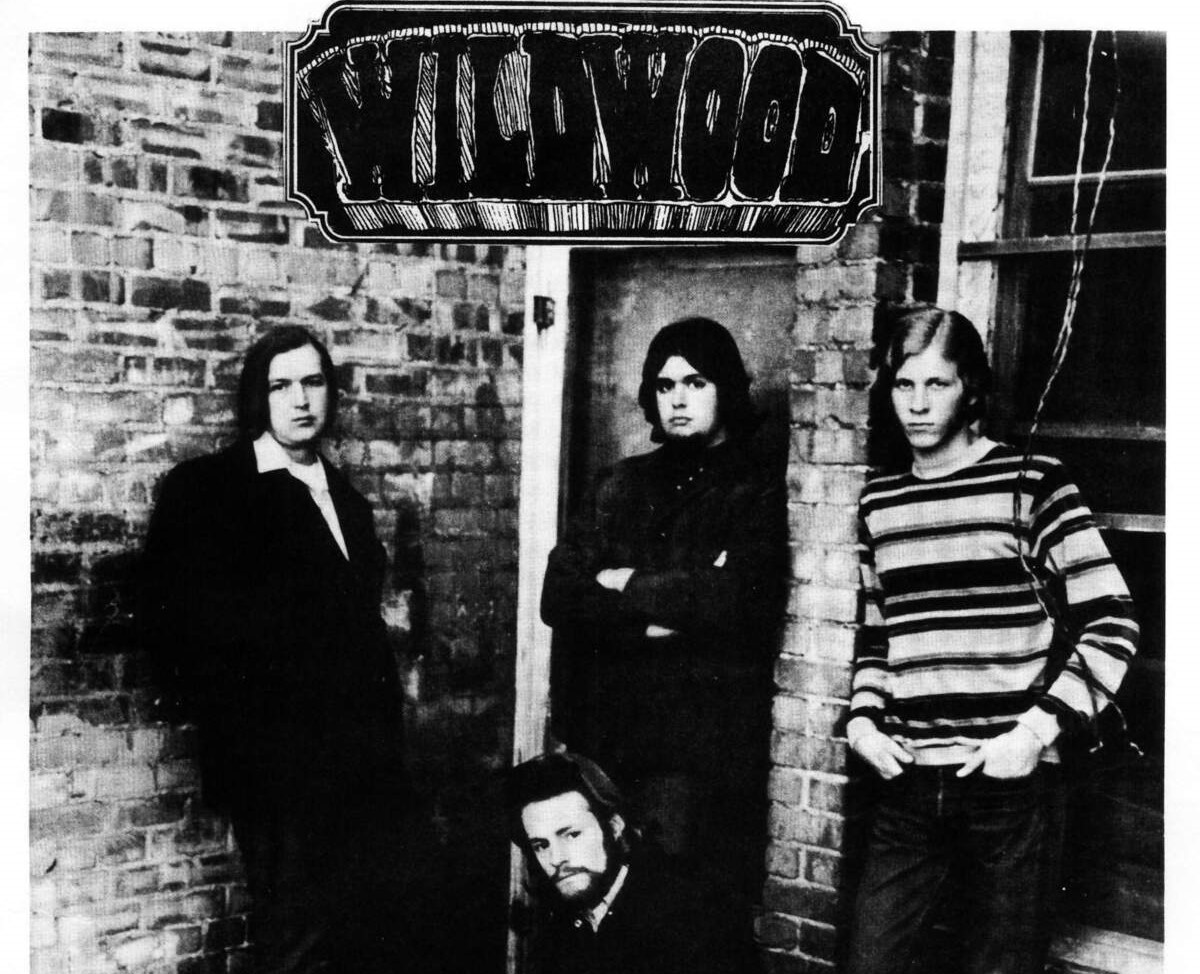
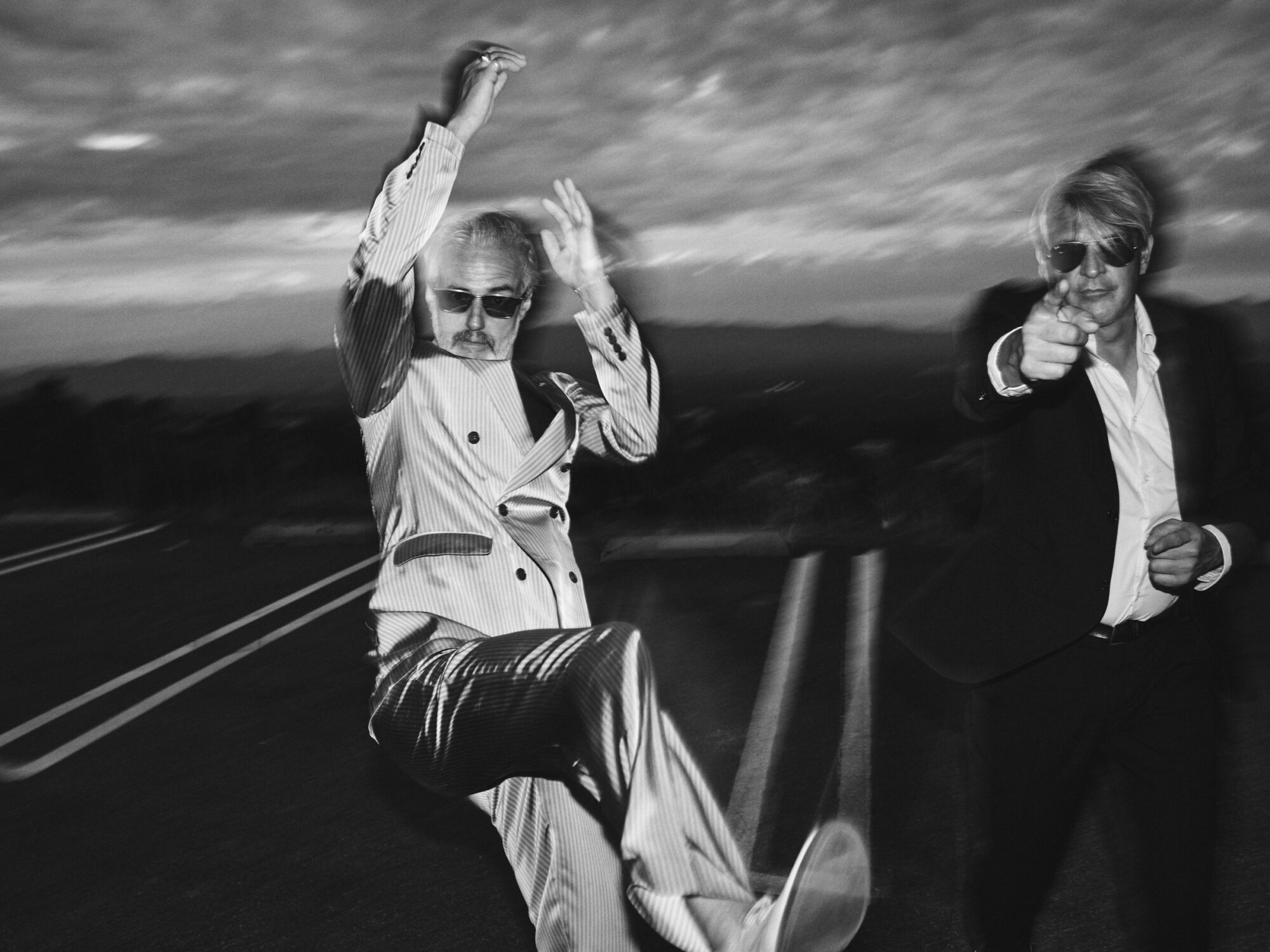
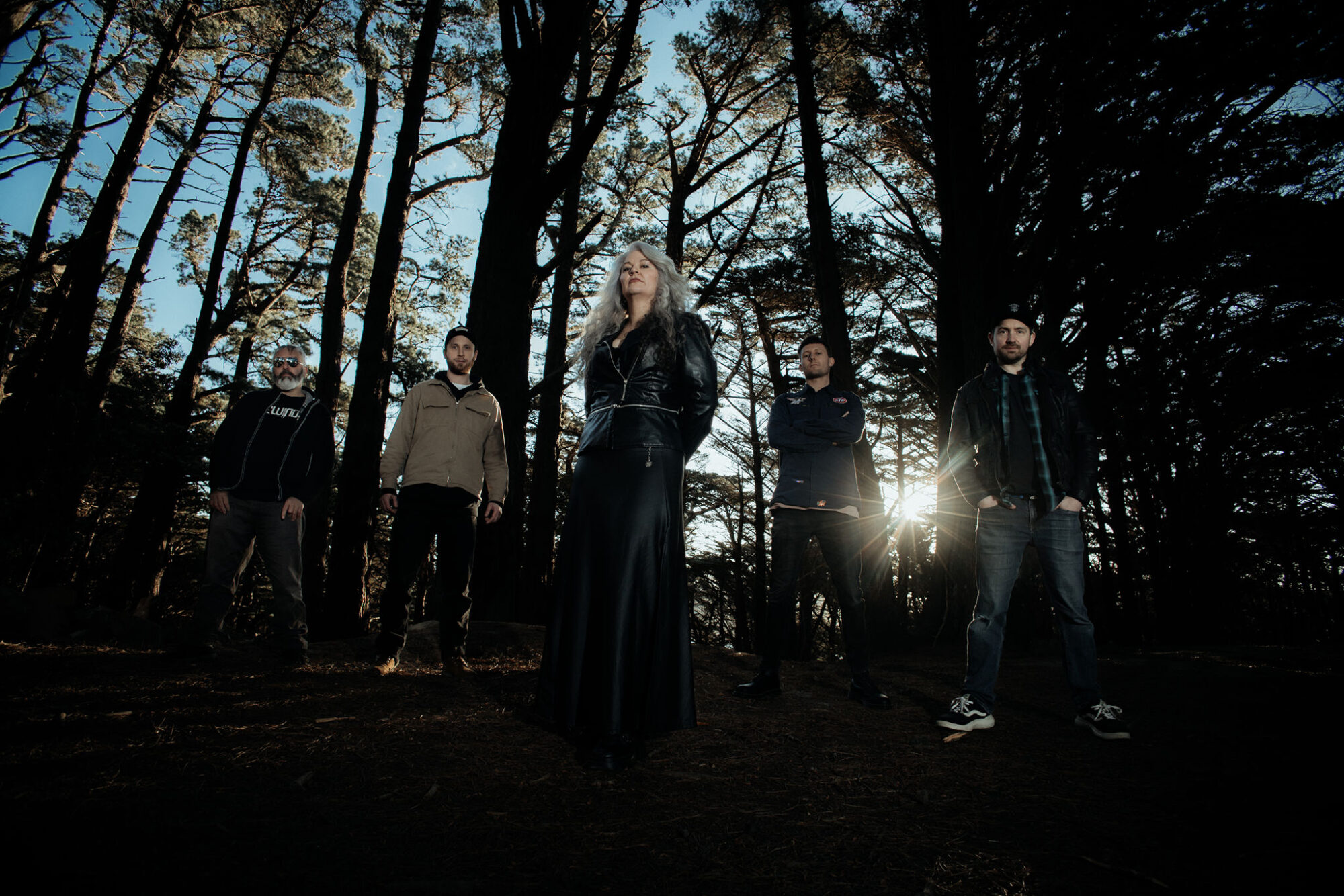
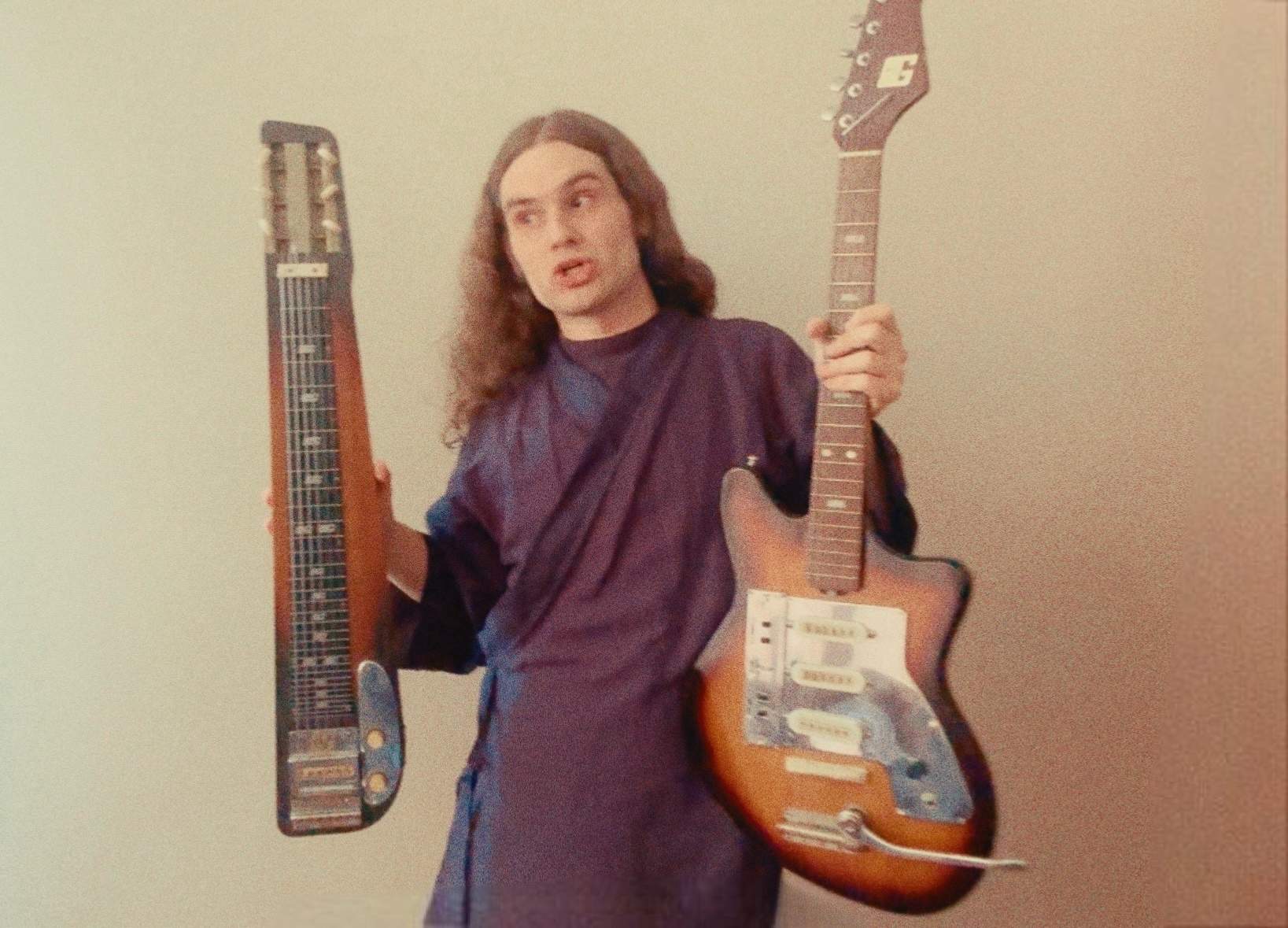
Thank you for the interview !